#and Richard was evidently aware of that (you could even argue that his actions in 1483 reflected his insecurity in that regard)
Text
"Because Richard (III) usurped the throne, his retinue is inevitably seen as inimical to the crown and therefore in an important sense independent of royal authority. In the context of Edward IV's reign, in which the retinue was created, neither assumption is true. The development of the retinue would have been impossible without royal backing and reflected, rather than negated, the king's authority. Within the north itself, Gloucester's connection subsumed that of the crown. Elsewhere, in East Anglia and in Wales, that focus for royal servants was provided by others, but Gloucester was still part of that royal connection, not remote from it. In the rest of England, as constable and admiral, he had contributed to the enforcement of royal authority. When he seized power in 1483 he did not do it from outside the prevailing political structure but from its heart."
-Rosemary Horrox, "Richard III: A Study of Service"
#richard iii#english history#my post#Richard was certainly very powerful in the north but to claim that he 'practically ruled' or was king in all but name is very misleading#his power/success/popularity were not detached from Edward IV's rule but a fundamental part/reflection/extension of Edward IV's rule#even more so that anyone else because he was Edward's own brother#there's also the 1475 clause to consider: Richard & Anne would hold their titles jointly and in descent only as long as George Neville#also had heirs. Otherwise Richard's title would revert to life interest. His power was certainly exceptional but his position wasn't as#absolute or indefinite as is often assumed. It WAS fundamentally tied to his brother's favor just like everyone else#and Richard was evidently aware of that (you could even argue that his actions in 1483 reflected his insecurity in that regard)#once again: when discussing Edward IV's reign & Richard III's subsequent usurpation it's really important to not fall prey to hindsight#for example: A.J Pollard's assumption that Edward IV had no choice but to helplessly give into his overbearing brothers' demands#and had to use all his strength to make Richard to heed to his command which fell apart after he died and Richard was unleashed#(which subsequently forms the basis of Pollard's criticism of Edward IV's reign & character along with his misinterpretation of the actions#of Edward IV's council & its main players after his death who were nowhere near as divided or hostile as Pollard assumes)#is laughably inaccurate. Edward IV was certainly indulgent and was more passive/encouraging where Richard (solely Richard) was concerned#but he was by no means unaware or insert. His backing was necessary to build up Richard's power and he was clearly involved & invested#evidenced by how he systematically depowered George of Clarence (which Clarence explicitly recognized) and empowered Richard#and in any case: to use Richard as an example to generalize assumptions of the power other magnates held during Edward IV's reign#- and to judge Edward's reign with that specific assumption in mind - is extremely misleading and objectively inaccurate#Richard's power was singular and exceptional and undoubtedly tied to the fact that he was Edward's own brother. It wasn't commonplace.#as Horrox says: apart from Richard the power enjoyed by noble associates under Edward IV was fairly analogous to the power enjoyed by#noble associates under Henry VII. and absolutely nobody claims that HE over-powered or was ruled by his nobles or subjects#the idea that Richard's usurpation was 'inevitable' and the direct result of Edward empowering him is laughable#contemporaries unanimously expected Edward V's peaceful succession. Why on earth would anyone - least of all Edward -#expect Richard to usurp his own nephew in a way that went far beyond the political norms of the time?#that was the key reason why the usurpation was possible at all#as David Horspool says: RICHARD was the 'overriding factor' of his own usurpation There's no need to minimize or outright deny his agency#as Charles Ross evidently did
13 notes
·
View notes
Text
On The Grinning Man and the De-Politicization of L'Homme Qui Rit (a Spontaneous Essay)
Since I watched The Grinning Man I’ve been meaning to write a post comparing it to The Man Who Laughs but I have a lot of opinions and analysis I wanted to do so I have been putting it off for ages. So here goes! If I were to make a post where I explain everything the musical changes it would definitely go over the word limit, so I’ll mostly stick to the thematic. Let me know if that’s a post you’d like to see, though!
Ultimately, The Grinning Man isn’t really an adaptation of the Man Who Laughs. It keeps some of the major plot beats (a disfigured young man with a mysterious past raised by a man and his wolf to perform to make a living alongside the blind girl he rescued from the snow, restored to his aristocratic past by chance after their show is seen by Lord David and Duchess Josiana, and the interference of the scheming Barkilphedro…. well, that’s just about it). The problem I had with the show, however, wasn’t the plot points not syncing up, it was the thematic inconsistency with the book. By replacing the book’s antagonistic act—the existence of a privileged ruling class—with the actions of one or two individuals from the lower class, transforming the societal tragedy into a revenge plot, and reducing the pain of dehumanization and abuse to the pain of a physical wound, The Grinning Man is a sanitized, thematically weak failure to adapt The Man Who Laughs.
I think the main change is related to the reason I posit the book never made it in the English-speaking world. The musical was made in England, the setting of the book which was so critical of its monarchy, it’s aristocracy, and the failings of its society in ways that really haven’t been remedied so far. It might be a bit of a jump to assume this is connected, but I have evidence. They refer to it as a place somewhat like our own, but change King James to King Clarence, and Queen Anne to Angelica. Obviously, the events of the book are fictional, and it was a weird move for Hugo to implicate real historical figures as responsible for the torture of a child, but it clearly served a purpose in his political criticism that the creative team made a choice to erase. They didn’t just change the names, though, they replaced the responsibility completely. In the book, Gwynplaine’s disfigurement—I will be referring to him as Gwynplaine because I think the musical calling him Grinpayne was an incredibly stupid and cruel choice—was done to him very deliberately, with malice aforethought, at the order of the king. The king represents the oppression of the privileged, and having the fault be all Barkilphédro loses a lot thematically. The antagonism of the rich is replaced by the cruelty of an upwardly mobile poor man (Barkilphédro), and the complicity of another poor man.
The other “villain” of the original story is the way that Gwynplaine is treated. I think for 1869, this was a very ahead-of-its-time approach to disability, which almost resembles the contemporary understanding of the Social Model of disability. (Sidenote: I can’t argue on Déa’s behalf. Hugo really dropped the ball with her. I’m going to take a moment to shout out the musical for the strength and agency they gave Déa.) The way the public treats Gwynplaine was kind of absent from the show. I thought it was a very interesting and potentially good choice to have the audience enter the role of Gwynplaine’s audience (the first they see of him is onstage, performing as the Grinning Man) rather than the role of the reader (where we first see him as a child, fleeing a storm). If done right, this could have explored the story’s theme of our tendency to place our empathy on hold in order to be distracted and feel good, eventually returning to critique the audience’s complicity in Gwynplaine’s treatment. However, since Grinpayne’s suffering is primarily based in the angst caused by his missing past and the physical pain of his wound (long-healed into a network of scars in the book) [a quick side-note: I think it was refreshing to see chronic pain appear in media, you almost never see that, but I wish it wasn’t in place of the depth of the original story], the audience does not have to confront their role in his pain. They hardly play one. Instead, it is Barkilphédro, the singular villain, who is responsible for Grinpayne’s suffering. Absolving the audience and the systems of power which put us comfortably in our seats to watch the show of pain and misery by relegating responsibility to one character, the audience gets to go home feeling good.
If you want to stretch, the villain of the Grinning Man could be two people and not one. It doesn’t really matter, since it still comes back to individual fault, not even the individual fault of a person of high status, but one or two poor people. Musical!Ursus is an infinitely shittier person than his literary counterpart. In the book, Gwynplaine is still forced to perform spectacles that show off his appearance, but they’re a lot less personal and a lot less retraumatizing. In the musical, they randomly decided that not only would the role of the rich in the suffering of the poor be minimized, but also it would be poor people that hurt Grinpayne the most. Musical!Ursus idly allows a boy to be mutilated and then takes him in and forces him to perform a sanitized version of his own trauma while trying to convince him that he just needs to move on. In the book, he is much kinder. Their show, Chaos Vanquished, also allows him to show off as an acrobat and a singer, along with Déa, whose blindness isn’t exploited for the show at all. He performs because he needs to for them all to survive. He lives a complex life like real people do, of misery and joy. He’s not obsessed with “descanting on his own deformity” (dark shoutout to William Shakespeare for that little…infuriating line from Richard III), but rather thoughtfully aware of what it means. He deeply feels the reality of how he is seen and treated. Gwynplaine understands that he was hurt by the people who discarded him for looking different and for being poor, and he fucking goes off about it in the Parliament Confrontation scene (more to come on this). It is not a lesson he has to learn but a lesson he has to teach.
Grinpayne, on the other hand, spends his days in agony over his inability to recall who disfigured him, and his burning need to seek revenge. To me, this feels more than a little reminiscent of the trope of the Search for a Cure which is so pervasive in media portrayals of disability, in which disabled characters are able to think of nothing but how terribly wrong their lives went upon becoming disabled and plan out how they might rectify this. Grinpayne wants to avenge his mutilation. Gwynplaine wants to fix society. Sure, he decides to take the high road and not do this, and his learning is a valuable part of the musical’s story, but I think there’s something so awesome about how the book shows a disabled man who understands his life better than any abled mentor-philosophers who try to tell him how to feel. Nor is Gwynplaine fixed by Déa or vice versa, they merely find solace and strength in each other’s company and solidarity. The musical uses a lot of language about love making their bodies whole which feels off-base to me.
I must also note how deeply subversive the book was for making him actually happy: despite the pain he feels, he is able to enjoy his life in the company and solidarity he finds with Déa and takes pride in his ability to provide for her. The assumption that he should want to change his lot in life is not only directly addressed, but also stated outright as a failure of the audience: “You may think that had the offer been made to him to remove his deformity he would have grasped at it. Yet he would have refused it emphatically…Without his rictus… Déa would perhaps not have had bread every day”
He has a found family that he loves and that loves him. I thought having him come from a loving ~Noble~ family that meant more to him than Ursus did rather than having Ursus, a poor old man, be the most he had of a family in all his memory and having Déa end up being Ursus’ biological daughter really undercut the found family aspect of the book in a disappointing way.
Most important to me was the fundamental change that came from the removal of the Parliament Confrontation scene, on both the themes of the show and the character of Gwynplaine. When Gwyn’s heritage is revealed and his peerage is restored to him, he gets the opportunity to confront society’s problems in the House of Parliament. When Gwynplaine arrives in the House of Parliament, the Peers of England are voting on what inordinate sum to allow as income to the husband of the Queen. The Peers expect any patriotic member of their ranks to blithely agree to this vote: in essence, it is a courtesy. Having grown up in extreme poverty, Gwynplaine is outraged by the pettiness of this vote and votes no. The Peers, shocked by this transgression, allow him to take the stand and explain himself. In this scene, Gwynplaine brilliantly and profoundly confronts the evils of society. He shows the Peers their own shame, recounting how in his darkest times a “pauper nourished him” while a “king mutilated him.” Even though he says nothing remotely funny, he is received with howling laughter. This scene does a really good job framing disability as a problem of a corrupt, compassionless society rather than something wrong with the disabled individual (again, see the Social Model of disability, which is obviously flawed, but does a good job recognizing society that denies access, understanding and compassion—the kind not built on pity—as a central problem faced by disabled communities). It is the central moment of Hugo’s story thematically, which calls out the injustices in a system and forces the reader to reckon with it.
It is so radical and interesting and full that Gwynplaine is as brilliant and aware as he is. He sees himself as a part of a system of cruelty and seeks justice for it. He is an empathic, sharp-minded person who seeks to make things better not just for himself and his family, but for all who suffer as he did at the hands of Kings. Grinpayne’s rallying cry is “I will find and kill the man who crucified my face.” He later gets wise to the nature of life and abandons this, but in that he never actually gets to control his own relationship to his life. When I took a class about disability in the media one of the things that seemed to stand out to me most is that disabled people should be treated as the experts on their own experiences, which Gwynplaine is. Again, for a book written in 1869 that is radical. Grinpayne is soothed into understanding by the memory of his (rich) mother’s kindness.
I’ll give one more point of credit. I loved that there was a happy ending. But maybe that’s just me. The cast was stellar, and the puppetry was magnificent. I wanted to like the show so badly, but I just couldn’t get behind what it did to the story I loved.
#the grinning man#the man who laughs#tgm musical#l'homme qui rit#victor hugo#gwynplaine's parliament rambles#long post /
79 notes
·
View notes
Text
Bloodlines (2 of 3)
After receiving a vague warning from his mother about his cousin and Richard, Damian goes looking for his runaway ward.
Part of Batkid and Robin
~~~~~~~~~~~~~~~~~~~~~~~~~~~~~~
“Someone’s in the house.”
Damian paused, one foot out the door of the car. He turned to Jon to study him.
If it was a Bat, Jon wouldn’t have said anything so he could see how long it took Damian to notice. If it was Kon or Lara, he’d already be telling them off for breaking into their house. No one else in his family would have broken in and neither would most of their friends. If Jon didn’t recognize the person or considered the person a threat, he’d be worried. For most anyone else, he’d be annoyed.
He wasn’t worried or annoyed though, which only left one person.
“Stay here,” Damian sighed and got out.
Jon grunted, still staring at the house with enough fury that Damian was surprised his heat vision hadn’t activated.
Once inside, Damian dropped his keys into a dish on the entryway table then hung his jacket on the coat rack. “You know Jonathan doesn’t like it when you show up unannounced.”
“With your alien’s powers, I never should have made it inside without his knowledge.”
He came into the living room to see his mother sitting in an armchair, a pair of teacups waiting on the table next to her. “I asked you not to call him that. And it’s about being polite, Mother.”
She hummed and grabbed her cup. She tilted her head towards the chair next to her as she said, “He is never going to approve of me and I am never going to approve of him. This is something I have come to terms with so I wish you would as well.”
He ignored the invitation, crossing his arms and leaning against the doorway. “You only don’t approve because he doesn’t have any more interest in providing me -- and therefore you -- with an heir than I have in obtaining one so he won’t help you convince me to allow your scientists our DNA. You should just come to terms with the fact you’ll never have a grandkid.”
“But I already have one,” she said into her drink.
“What are you talking about?” he growled, marching into the room to loom over her. “What did you do?”
“Calm down, my Baby Bird, I haven’t done anything. You know I wouldn’t do that without your permission.”
“After what you did to Jason, how can I be sure?”
She sighed and placed her drink back on the dish. “This isn’t what I came here to talk to you about and, unfortunately, I don’t have time to debate with you as I have to cull another uprising of the Council of Demons. When was the last time you spoke to Richard?”
Damian frowned at the change in subject. “Why do you care?”
“The Demon’s Followers are gathering.”
“Have they joined forces with the Council?” That didn’t make sense. Mara was all about gathering power for herself and she wasn’t foolish enough to think she could use them for her own gain then betray them without facing serious consequences. “And what does this have to do with Richard?”
“So you really haven’t been paying attention to the boy’s antics.”
Damian bristled. He’d been watching as closely as was possible without risking Richard discovering the invasion of privacy, something he knew would surely drive the boy away forever. “I ask again, why do you care?”
His mother stood, brushing nonexistent wrinkles from her pants. “I suggest you look into what the boy has been up to. Perhaps ask your pet, I know he’s been hounding Richard.”
Damian opened his mouth to argue, but his mother just pressed a quick kiss to his cheek before slipping into the hall. “And tell your cousin that should my grandson face significant harm, the League will wipe her little organization from existence.”
“Mother!” He followed her into the hall, but she was already gone. He didn’t bother to give chase, knowing she wouldn’t tell him any more than she already had.
“What was that all about?” Jon asked, coming through the front door.
“I’m not sure.”
Oh, he could certainly put the pieces together.
Mara was up to something, something that could put Richard in danger, but what could she be up to that would put her on the Teen Titans’ radar? His team was efficient, but they didn’t handle the type of secretive things the League of Shadows or Outsiders dealt with. The kind of things the Demon’s Followers dealt in.
There was also his mother’s descriptor for Richard. Saying that his mother wasn’t fond of his family was an understatement. She absolutely loathed Tim and Duke, more than even Damian had during those first few months after he’d been brought back to life, and the Council’s interest in Tim had only aggravated her feelings for him. She was more neutral about Cass and Jason, but she saw his sister as a stand-in child that his father should have rid himself of when his true child arrived and she saw Jason as his and his father’s pet street trash. For her to not only claim his ward as her grandson, but to also place him under her protection was… out of character. They had never spoken about Richard before, what with her going dark due to the Council’s actions during his father’s absence followed by his feelings towards Jason’s death and resurrection, but Damian had assumed she’d feel no different for him than Jason given his circus heritage.
“Are you going to go talk to Richie?”
Damian shot his partner a look.
“Yeah, yeah, you’re giving him space. It’s been over a year, though, D. I think that’s enough space.”
“He has to come to me. If I force myself into his life -”
“He’ll resent you,” Jon finished. “Okay, but he’s got that Bat stubbornness you’ve all somehow managed to inherit from Bruce despite the fact most of you aren’t actually related to him. Richie’s not going to make the first move. So if neither of you reaches out…”
“I don’t have time for this,” Damian muttered, heading for the door to the basement. “I need to figure out what Mara is up to and if the Teen Titans can handle it on their own.”
“Bats,” Jon huffed and followed him down. He stayed on the stairs, though, as Damian opened the secret door that led down to the Perch. “Do you want any help?”
Damian paused. “… Not at this time. Somerset will need your focus while I’m distracted. If anything changes, I will let you know.”
“Alright.” Jon drifted up behind him to wrap his arms around Damian’s waist. “Just know I’m here if you need anything. And be careful.”
“I will.” He leaned back into his partner for a moment before pulling away.
~~~~~~~~~~~~~~~~~~~~~~~~~~~~~~
Red Hood was watching a factory burn when Flamebird found him. The teen had a gun pointed at his head before he could even speak. “Come for the fireworks, Boss-Bird.”
“I don’t want to fight. I need to talk to you. It’s about Robin,” Flamebird said, holding up his hands. He quickly ducked to the side when Red Hood shot at him.
“Yeah, no, you lost your chance to talk about him when you let Bitch-man kick him out.”
“That’s not what happened,” Flamebird said and threw a feather, lodging it in the gun’s barrel. “And it’s not the point. Mother came asking after him.”
That made Red Hood’s anger spike into fury, but at least he paused his attack. “She has even less of a right to talk about Red Bird.”
“Agreed, but I’m not about to ignore a warning about Robin’s safety, no matter who it came from.”
“So now you care?”
Flamebird sighed. “Hood, please, can we at least agree to put this aside for Robin’s sake?”
Hood threw the plugged gun at him. “You’ve got ninety seconds. This better be good.”
“Have you heard of the Demon’s Followers?” Flamebird asked as he grabbed the gun and slowly approached his brother.
“No. They related to your dear grandpa's cult?”
“Sort of. Like the Council, the Followers were a faction of the League that left when Mother took power. Instead of worshiping Ra’s, though, they follow my cousin.”
“You have a cousin?”
“Mara al Ghul, the daughter of one of Mother’s elder brothers. She resents me for leaving the League. She came after me when I was just forming the League of Shadows, but we took her down. The Followers have mostly operated as an organized band of mercenaries since, though Mara’s always looking for a way to gain power or spite me.”
“And you didn’t tell us about this because…?”
“I told Father, and I’m sure Barbara knows, but Mara shares Mother’s opinion of you all -”
“Meaning she thinks we’re trash.”
“- so there was never any reason to involve you.”
“Right,” Red Hood snipped. “And why does this matter?”
“Mother insinuated the Teen Titans have gotten or will get involved with the Followers, specifically with Mara putting Robin in harm’s way. When I asked for more information she acted surprised that I wasn’t already aware and suggested I speak to you. I looked into it and found evidence of the Followers in California, but nothing focused on Jump or the Teen Titans. So here I am.”
Red Hood crossed his arms and turned to leave. “Well, I haven’t heard about any Mara or her Followers so you’re out of luck. I’ll let Red Bird know to keep an eye out, though.”
Flamebird nodded, knowing he wouldn’t get any more out of his wayward brother. “Let him know she might use an alias as well. She has used Maria, Miranda, and Mariam for given names and Raatko, Tate, and Šabaḥ for surnames.”
“Sh-Shabac?” Red Hood said, looking over his shoulder.
“Šabaḥ,” Flamebird repeated slowly. “It means ghost in Arabic. She chose it to pay homage to her father, who went by White Ghost.”
Red Hood stared at him for a moment then pulled a communicator out of one of the pockets on his belt. “Shit, shit, shit!”
“What?”
“Shut up!” He brought one of his hands to his helmet and the red color leached away until only an X remained, the drain revealing a white skull on black. Similarly, glowing red X’s appeared on the back of his gloves and across his chest.
Red X flipped open the communicator and pressed a button on the side.
“What’s going on?”
“I swear, if they lost him again…” Red X muttered as the communicator rang.
“X -”
“Who is this?” a voice said from the communicator and Flamebird looked over to see Nightstar’s face staring back.
“Take a guess, Princess. Where’s Red Bird? And if you tell me you lost him to that stalker bitch again, I’m going to wreak bloody vengeance on the lot of you.”
Nightstar scowled, but was knocked out of view before she could say anything by Impulse. “What stalker? Do you know something about Robin’s disappearance? Howdidyoucallus? WhydoyouhaveaT-Comm?”
“Bloody. Vengeance,” Red X growled and Flamebird grabbed the communicator before he could destroy it.
Impulse gasped as he came into view, but he ignored her. “What do you mean Robin disappeared?”
“I, uh…” Impulse glanced between him and someone offscreen. She mouthed, Help!
The screen’s view expanded to show the rest of Robin’s team.
Virus was vibrating, the edges of their body going to static. Nightstar was glaring up at him, eyes glowing. Impulse was still gaping and Wonder Girl looked startled as well, but was working to hide it as she stepped forward.
“Flamebird, this is unexpected. What are you doing with Red X?”
“We’re looking for my baby brother!” Red X growled.
“X, calm down,” Flambird said and the boy flipped him off. “What can you tell me about Robin’s disappearance?”
“Why do you care?” Nightstar asked, eyes narrowing further.
Flamebird breathed out through his nose as Red X snorted. “Knew I liked you, Princess. I’ll make your death quick.”
“I received information about a dangerous group of mercenaries in your area. There may be a connection. What happened?”
Virus leaned towards Impulse and whispered, “Are the Teen Titans going to work with the Flamebird?”
“I think so. This is so cool! Do you think Batgirl will be there?”
“Or Nightwing!?”
“We can hear you, dorks,” Red X huffed and the two flinched, Virus ducking behind Nightstar and Impulse blushing. “Just tell us what happened to Robin!”
Wonder Girl cleared her throat. “Well, last night Impulse and Robin were on a date at the boardwalk.”
Flamebird blinked.
Red X snorted. “What? Didn’t know your kid had a girlfriend?”
“His kid?” Impulse squeaked.
“Flamebird is Robin’s father?” Virus asked.
Wonder Girl looked at her team, uncertain, and Nightstar sighed.
“Short answer: No, he isn’t. It’s complicated and not important right now,” she said with finality. “Robin and Impulse were at the boardwalk. They got separated in the mirror maze and no one’s seen him since. We searched the entire area, but couldn’t find any evidence of where he could have gone.”
“Virus scanned the maze,” Virus said. “Impulse was worried Robin’s disappearance was the work of Mirror Master or Reflek, but Virus didn't find any energy anomalies, not even any that would suggest teleportation. Robin just vanished.”
“You didn’t even find evidence of a fight?” Flamebird asked and the teens shook their heads. “Have you faced anyone recently who could have taken out Robin without leaving evidence?”
Wonder Girl shook her head. “We’ve considered that, but there aren’t many of our villains that could who aren’t locked up right now. The only one we considered was, well,” she gestured vaguely, “X. But Nightstar said she had evidence he wasn’t in Jump City at the time.”
Flamebird nodded, well aware that his youngest brother had been taking down a warehouse of drug dealers in Gotham the night before.
“Did you consider White when you went through your list?” Red X asked pointedly.
The teens shared a look.
“White hasn’t bothered any of us since she came back to life,” Impulse said.
“Maybe because she’s been reconnecting with all her minions,” he snorted. “I thought Red Bird said he was trying to track her progress.”
The teens looked uncomfortable.
“Which none of you knew because you all get mad when he investigates her. Of course.”
Nightstar crossed her arms. “He’s obsessed. We -”
“News flash, your teammate is a Bat. Any of your relatives who’ve worked with one of us could tell you that obsession and Paranoia come with the gig. And that’s, you know, ignoring the fact that that psycho is stalking him.”
“Stalking?” Flamebird asked.
“You better hope he’s fine when I rescue him or I'll raze that tower to the ground,” Red X said then snapped the communicator closed.
“What’s going on? Who’s White?” Flamebird asked as Red X grabbed the communicator and shoved it into his belt.
The boy stared him down for a moment then groaned and switched his suit back to Red Hood. “Follow me.”
His brother led him to a dilapidated apartment building. As he perched on a ledge to open a window, he muttered, “I’ll have to burn this safehouse now.”
The apartment was sparsely furnished, just a small card table with two folding chairs on either side and a couch in front of a book-covered coffee table. It was tidy, though. The books on the table were in neat, organized stacks. The kitchen counters were wiped clean and the only dishes that were out were the ones drying on the rack. The mattress that could be seen through the half-open bedroom door was also made to Alfred’s exacting standards despite its lack of frame or box spring.
Red Hood stomped across the living room to a closet door, opening it with a keycode to reveal weapons and ammunition arranged on shelves. He grabbed a tablet off a lower shelf and pulled up a file.
“She’s called the White Woman,” he said, opening an image for Flamebird to see.
The woman was covered from head to toe in a white suit styled after a Komon. The skirt only went halfway down her knees, though, revealing grey leggings that matched the obi around her waist and the hood that hid her hair and neck by connecting the suit to her hannya mask. Like the suit, the mask was primarily white, just with silver teeth, horns, and eyes. She also wore silver boots and gloves along with a matching utility belt over the obi that was designed to look like an obijime. A sword was strapped to her back, though he couldn’t see what kind from the angle.
“She started setting up shop in Jump City around a year ago. Her motivations weren’t very clear at first. Her lackeys stole and she set other villains loose on the city, but there didn’t really seem to be any goal in mind.”
“But she did have a goal.”
Red Hood nodded. “Dick realized she’d been testing the Titans, toying with them. He thought she was planning something for them, like trying to figure out how to take them down so she could take over. He… miscalculated.” He closed the picture and opened a new one from the file. “She was only after one of them.”
The image appeared to have been captured by a security camera. Richard was clearly the focal point, but he wasn’t Robin. The suit he was wearing almost seemed to be mocking the Robin suit. The tunic was still red, but a darker blood-like color that had also replaced the green on his boots and gloves. His belt, cape lining, and tunic’s trim were a dull silver instead of bright yellow and his sleeves, pants, and cape had inverted from black to stark white. His domino mask has similarly flipped colors, going from a black mask with white lenses to a white mask with black lenses. The R logo on his chest was replaced by a silver and black bird’s claw.
“Don’t know a lot of what went down since Red Bird did a hell of a job burying everything, but Robin went renegade for a week or two and started working with White. I thought he had just been undercover, but one of the few things Dick would tell me about his renegade act was that he wasn’t doing it by choice. She forced him to become her apprentice somehow, the creepy bitch. She’s obsessed with him, and would probably still be after him if she hadn’t died about six months back after one of her schemes backfired on her.”
Flamebird frowned as he switched the picture back to White.
“I’m sorry, I don’t know where Talia is,” Nyssa had said when Damian had contacted her after he’d found out about Red Hood. “She cut contact with me two weeks ago. Apparently, she objected to my use of the pits. If only you had called earlier so I could have called out the hypocrisy. Healing my niece is a far better use of the pits than fixing your pet.”
At the time, Damian had been so focused on arguing that Jason wasn’t a pet, he hadn’t questioned why Mara had needed to be healed in the pit. Especially one of Nyssa’s, which rarely saw use as his aunt was far warier of the effects of the pits than his mother or grandfather.
“Mara’s the White Woman,” Flamebird said, eyes tracing her mask. It reminded him of the Oni mask she’d worn thirteen years earlier, when she’d first attacked his team. “But why would she suddenly target Jump City?”
“Specifically Dick,” Red Hood corrected. “And beats me. Like we established, none of you al Ghuls give a crap about us.”
Flamebird opened his mouth, to argue that he did care. He cared about his Robin and he cared about his Batkid, no matter what either boy might think.
Then he froze.
“Grandson.”
“What?”
“When she came to warn me, Mother called Richard her grandson,” Flamebird said, turning towards the window. “I don’t know why she’d claim him as family, let alone acknowledging him as my heir, but if she was willing to overlook our lack of blood relation -”
“White could too,” Red Hood finished, tossing the tablet back into the closet and slamming the door closed. It locked automatically as the anti-hero raced after his elder brother. “She’s been targeting Dick to get at you, and you didn’t. Even. Notice!”
“I need to find Robin.” Flamebird pulled out his grapple gun, but Red Hood grabbed his arm before he could fire.
“I’ll find him. You’ve done enough.”
“I have a list of places where Mara might be.”
“And I have a list of places where White might be.”
Flamebird pulled his arm away, but turned to the boy. “Then we can compare our lists and narrow it down.”
“Not happening,” Red Hood growled.
“Ho-Jason,” Flamebird said, setting his hand on his brother’s shoulder. “This is about Richard, remember. Our focus right now should be locating him as fast as possible. You can be as mad at me as you want later.”
Red Hood slapped the hand away. “I’m going to shoot you in the kneecaps when this is over.”
~~~~~~~~~~~~~~~~~~~~~~~~~~~~~~
For clarification:
League of Assassins: The normal LoA in the comics, ran by Talia (with Nyssa as an advisor when they aren't fighting)
League of Shadows: Dami's team (Flamebird, Nightwing, Abuse, Beacon, Flyway, Nobody, Quick)
Council of Demons: A cult that worships Ra's and seeks to bring him back to life
Demon's Followers: Mara's criminal organization
5 notes
·
View notes
Text
Flowers in Blood
A/N: Ooo the plot thickens! Also, I feel like I write my fics at a fast pace with time. Idk I don’t mean to write an entire novel (yet) Also, I KNOW that the gif isn’t The Night Manager but I ran out of gifs? Translations provided on AO3 because ya gurl lazy.
Summary: Plans go wrong
Warnings: THIS CHAPTER DOES CONTAIN VIOLENCE AND A NON GRAPHIC IMPLICATION OF ASSAULT.
Taglist: @lucywrites02 , @shiningloki
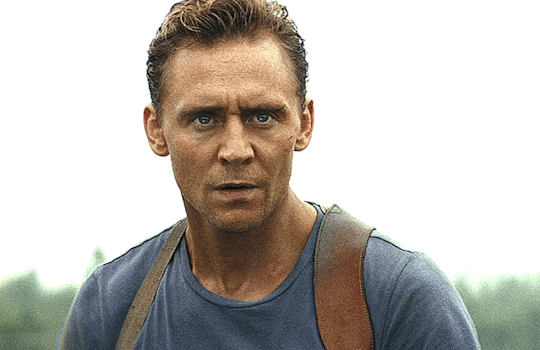
Chapter 17: Wisteria p. iii
Jonathan collapsed next to Katie, panting hard after their fourth round of sex that night. When they had gotten home, Katie suggested taking a shower and bath together… Which led to the third round of sex. After that, Jonathan wanted to go down on her properly which led to the fourth and final round of intense love making.
"I think-" Katie panted, looking over at Jonathan and giggling "I think maybe we should call it quits tonight." Exhaustion was evident in her voice and nuzzled closely to her boyfriend.
"I'm inclined to agree." Jonathan wraps an arm around her, chuckling at how much they fucked yesterday and today. "For God sake, you'd think I'm a spry young man again with how many times I've wanted to make love to you." He raised his brows and pulled the sheets over their cooling bodies. Sleep was not too far behind Pine either as his eyelids began to droop. He stared at Katie, watching her fall into a deep, peaceful slumber. Never before had he felt so attached to one person. He was crazy for this girl and it almost scared him from just how insatiable his feelings were for her. Despite the actions of tonight, Pine couldn't help but feel something was about to go wrong. Because of his grim intuition, Jonathan came up with an idea of how to take down Wisteria once and for all… Although he wasn't happy about what this idea exactly was.
------------
"I'm surprised you even agreed to it." Roper spoke, unlit cigarette between his lips.
Abbadon scrunched her nose in disgust and stared out at the sea. She and Roper were personally stationed at one of Masayuki's elaborate, traditional homes. This particular "sanctuary" was untouched by any sort of business as it resided on the cliffside. There was access to a private beach, a natural hot spring a bit further away in the forest, and other necessities of a cliffside manor. "I never agreed to anything, Roper." She huffed and pulled her shawl around her shoulders, chilled from the bite of the sea breeze. “I’m doing this for myself and my son, I’ve told you this.”
Richard took a drag off of his now lit cigarette and blew smoke out, putting his lighter away. “Yes, so you have. I’m just curious though… Do you actually think your tyrant of a brother will ever let you see your son again?”
Anger flared up in the woman’s eyes and she grabbed Roper by the collar of his coat, teeth bared. “You already know the answer to that!” She threw him back with a little force and snarled. “I do not appreciate you bringing my son into conversation in such a casual manner! You are lucky that I did not push you harder or you would be tumbling to your pitiful death-”
“My fellow comrades! Why all the arguing?” Travis stepped out from the house, looking over the cliffside for a moment and shuddering. He did not do well with heights at all and was rather angry at Masayuki for choosing this to be their base.
Abbadon glared at Richard, storming past him and then giving the same glare, with just as much venom, to Travis. “Comrades? You’re joking. I would never even consider a sick fuck like you to be an ally.” She spat, going back into the manor to escape the men and bitter cold.
Travis whistled, walking to Roper and grinning at him. “You know I should really shove you off the edge of this cliff for what you did to my men.”
Roper puffed out smoke, raising his brows and did not seem bothered by his comment in the slightest. “You’d be the second person today to inform me that you’d like to shove me off the cliff. Come up with something more original, will you? Also, get better men who can actually dodge.” A small smirk touched his lips.
Instead of being offended, the leader of Bloodroot let out a cold laugh and shook his head. “I’m actually glad you got rid of them, though I had to take care of Andrew after. He’s rotting somewhere in that one forest near Mt. Fuji… I didn’t kill him, I convinced him to do the deed himself. I know how to make a person go mad with doubt, I know how to break them and plant lies into their heads…”
“You truly are a sick fucker aren’t you?” Richard put his cigarette out and frowned. “Telling someone to kill themselves just because they aren’t up to your standards. That’s low, Travis. I can’t say much myself though, but at least I don’t get pleasure out of doing it.” He began to make his way back inside, turning around one last time. “Oh and by the way, maybe I should shove you off of the cliff. You seem to be the most deranged out of us all and will be better off dead than alive.”
-----------------
The next morning arrived with Jonathan carefully examining the outside of their rental. He did notice some activity that confirmed his suspicions of last night. It seemed a bit odd that Masayuki didn’t have any bodyguards with him and lacked henchmen yesterday. Pine knew that he had something up his sleeve for the strange absence of men. However, Katie did point out as they were walking home that two men had been following them at a short distance. They had dressed as normal civilians but acted too suspicious to actually be residents of the area. The same two men were found stalking about outside near the rental, making Jonathan uneasy. There were too many innocent people around and he didn’t want to have another blood bath like the time at The Prince Sakura, just a few weeks ago. His phone began to ring and he went inside, answering it. “Angela, we’re in a bit of a tight spot.”
“I know that already by the sound of your voice… But you’ve also got a plan haven’t you?” Angela was browsing a toy store, looking for something for her little one. It didn’t help that she couldn’t read Japanese so she was having a bit of a hard time with it.
“Yeah, but it involves us voluntarily giving ourselves up to get closer to Wisteria and take Masayuki down. I’m having Kate contact the police today to inform them of our plan and that they are going to need back up. I can’t imagine that the manor is going to be empty when we arrive.” Pine looked over his shoulder, making sure Katie wasn’t around at the moment. “We have visitors outside of our rental. Some of Wisteria henchmen. They followed us last night after I got Kate out of the situation she was in. I can’t talk for too much longer as we need to get this plan set in stone. I’ll send you a text later-” Jonathan hung up and walked over to the stairwell, only to find Katie standing there. He rubbed the back of his neck out of slight guilt, “You heard everything, didn’t you?”
The brunette nods, walking down and moving past Jonathan. “I did. I don’t know if that plan will work, Jonathan.” She turned to face him, uncertainty evident in her voice. “Masayuki has Bloodroot with him too. Who knows if Travis and his scum bags are also there. We can’t count on police interference when we don’t know how many of them there are.” She swallowed hard. This was a risky move, but in order to not shed blood this was their only option. The thought of more innocent people dying had Katie’s stomach churn. Like Pine, she did not want a repeat of The Prince Sakura; especially since there were children out and about.
“So what are we going to do then? Wait like sitting ducks? We don’t have time Kate, it’s either we call for backup and tell them we found his main base or people die.” Jonathan walked down, his brows knit together in concern. Logically, the law enforcement was more than aware of Masayuki’s crimes but had no clue of where his base was. They had enough evidence to lock him up for life already as he had been arrested a plethora of times beforehand. All they needed was the base location.
“No!” Katie shook her head and looked at her boyfriend like he was crazy. She turned her gaze away from him and sighed deeply, pinching the bridge of her nose. “I just-... We’ve spent so much time together that I almost forgot we had a job to do.” She admitted quietly and turned her back on Pine. “Alright. I-I’ll call the police but then what happens after that?”
“We hand ourselves over like I said. I suggest you get dressed in something you’ll be able to fight in and not just my shirt.” He walked over, giving her bare ass a smack and grinning. Jonathan did his best to lighten the grim mood, but he only received a whine of annoyance.
After about an hour long phone call, Katie and Jonathan prepared themselves for their plan. Like Pine had said earlier, Katie put on more suitable wear for fighting as it was inevitable. “They should be heading to the location now.” The brunette placed her knife on her belt loop, pulling her cardigan down over it. She let out a shaky breath, more nervous than before as this was more dangerous than anything she had previously encountered.
“Hey.” Jonathan took her shoulder gently, turning her to face him and tilting her chin up. “It’s gonna be ok, baby.” His eyes gleamed truthfully. “I won’t let anything happen to you.” He leaned in, kissing Katie deeply.
Katie kissed back just as eagerly, her arms wrapped around his neck and body pressed against his. She opened her mouth, allowing his tongue in and moaning softly.
Pine pulled away before things could get more heated, the sex would have to wait. “Come on.” He took her hand in his own, lacing his fingers with hers as he led them both out.
The brunette turned around and let go of Jonathan’s hand to lock the door. “I’ll go first.” She took a deep breath, stepping out into the street with her head held high. “Oi! Watashi ga kita, anata wa kakureru koto kara nukedasu koto ga dekimasu.” She spoke loudly and waited for the two men that had followed them to walk out. Instead of just two, around ten men walked out causing Katie to gasp and run for Pine. “Watashi o hanashite!!” She felt hands grab her and heard Jonathan yell for her. “Hanashite!!” This was not going as they had planned.
“Iiya, anata wa jōshi e no tokubetsu haitatsudesu.” One of the men holding her chuckled. “Zan’nen’na! Watashitachi wa anata ga nani o shiyou to shite ita ka o sudeni shitte imasu. Keisatsu wa ima anata o tasukeru koto ga dekimasen. Watashitachi wa sukoshi mae ni sono mondai ni taisho shimashita.” He clicked his tongue and held his phone up, showing Katie pictures of the slaughter that had been committed shortly after she had made her call.
“S-Sore muri!!” Her eyes were wide with horror as she couldn’t believe they had gotten one step ahead of them. A cry of pain brought her out of her disbelief as she looked over to see Pine being pummeled. “YAMETE!!” KARE O HANATTE OITE!!” She cried out, tears streaming down her face as she was helpless against the five men who held her still. “YAMETE!!” She begged, beginning to thrash her body. A cloth was placed over her mouth and nose as she struggled to break free and soon her body fell still and vision blacked out. Pine had been put in the same predicament as he fell victim to a chloroform rag as well. Both of them were lifted over the henchmen’s shoulders and carried out of their street. As they were being carried, blood of the innocent had once again been spilled as it stained the road. Bodies of families and on goers littered the streets every other house. An hour later, police had finally showed up, but it had already been too late; lives had been lost by the hands of Wisteria once more.
------------------
“D-Daniel-san!!” Masayuki sat up straight, shoving one of his male whores off of him as his boss made an entrance. “What a p-pleasant surprise to see you, sir! Yes, come in! Please have a seat-”
The dark haired man waved his hand and smiled, “Oh no I won’t be staying for very long. I have news that troubles me so and I believe you have the answer.” He began to walk toward Masayuki, prowling around him like a predator ready to strike. “You see, I had been told my dear sister is wandering about in the streets of this country after escaping the place I ordered her to stay put.” His golden eyes shimmered maliciously. “Why didn’t you inform me the minute she had visited, Kibutsuji? Hm? Is it because you were too busy counting your money? Fucking a whore or two? Touching my μικρό ποντίκι? Oh I’m very aware of that too and how you fancy her. I have agents everywhere, “Yakuza lord”, and unlike you they actually inform me immediately of things that do not necessarily please me.” Daniel turned around, nodding to the three bodyguards that came in with him. He watched as they exited the vicinity before turning his nefarious gaze back to Masayuki.
The leader of Wisteria ordered his whores and servants to leave, but his bodyguards to stay. “So, you have come here to taunt me? To insult my services to you?” He growled, grabbing a long, slim object from behind him.
His action did not go unnoticed and Daniel took this as a sign of betrayal. “No. I have come here to inform you of your mistakes… And that Wisteria is no longer required of it’s services. From here on out, Daphne will be taking charge of Wisteria’s business as The Tigress has proved herself recently.” The vile man grinned wickedly.
Masayuki flicked his hand forth, eyes wide with anger “ROKUDENASHI O KOROSU!!” His men flew past their leader and pulled out their Katana they had been hiding.
Daniel cracked his neck and chuckled, dodging the swings of the blades and knocking the weapons out of the henchmen's hands. “Pathetic.” He muttered, grabbing one of the swords and cleanly decapitating one of them. “Wrong choice to try and kill me!” He taunted, again moving with fluidity and disemboweling the other henchman. This left Masayuki and Daniel at a standoff.
Nostrils flared, the Yakuza lord ripped his shirt off to show his tattoos that covered his entire torso. “It will be you that dies by my blade.” He removed his katana from its sheath and drew a deep breath, focusing his energy. “BY THE BLOOD OF THE SAMURAI!!” Masayuki cried out, charging forth and clashing blades with Daniel.
“Good! I haven’t had this much fun in ages!! Finally I get to show you how truly deadly I am.” Daniel purred, putting one arm behind his back and effortlessly knocking the strikes against him back. “Come now, are you really using old Samurai techniques? This is the 21st century Masayuki! Not the age of the warrior!” Belladonna’s leader spun around, slamming his blade down upon his opponent’s wrist. To add to injury, Daniel then sliced Masayuki’s achilles tendons and hamstrings. “Tsk, I was expecting more of a challenge.” He frowned and raised his eyebrows at the screaming crime lord. His eyes shined with pure evil as he watched Masayuki lay on the floor, bleeding out. “I could give you mercy and just slit your throat here and now, but what fun would that be?” He knelt down to look him in his dying eyes. “Sayonara, failed samurai.” He chuckled softly before standing up and tossing the blade aside, walking out and leaving the former Wisteria leader to die from a dishonorable way.
“Sir, Richard Roper is on the line.” One of Daniel’s henchmen handed the leader his phone.
“Ahh yes! Roper my friend, you have my sister with you do you not?” Daniel shucked off his white suit coat as it had been stained with blood.
Richard looked down at a bound Abbadon and snorted, “Already set for you Mr. Hasapis-”
“YOU SON OF A BITCH!! I WILL HAVE YOUR FUCKING HEAD!! BOTH OF YOU!! DO YOU HEAR ME!?” Abbadon shrieked, her teeth bared. Not too long ago, she had been tricked by Roper into believing he had a way to get to her son. Angry tears ran down her pale face as she glared at Richard, she was upset with herself enough, but more so that she thought Roper may have been an ally. Abbadon truly believed that maybe Roper was perhaps willing to help her as he could relate to her situation.
“Tsk, such a filthy mouth on her. Didn’t your mother ever use soap?” Richard chuckled to himself, lighting a cigarette.
“Unfortunately, no. That is a good idea though! Perhaps we should consider cutting her tongue out if she speaks to me like that again- On second thought maybe we will cut Niko-” Daniel smiled to himself as he heard his sister wail at the threat, taking pleasure in listening to her pain. “Anyways, Wisteria has been taken care of and handed over to The Tigress over in Seoul. She has impressed me as of late with the amount of prostitutes she has pushed through. She also has managed to find time to pick up Wisteria’s slack, which further impressed me. In the meantime, I will be flying out to Korea tonight to get things settled in. I want my sister in Seoul by the morning, is this understood, Roper?”
“But of course, Mr. Hasapis, but of course.” Roper hung the phone up and then ordered his men to take a hysterical Abbadon away. “Those two should be here shortly.” He took a drag off of his partially forgotten cigarette and walked out of the room Abbadon had previously taken space in.
Just in time, two men walked in with an unconscious Katie O’Connor in one’s arms. The other man threw a half conscious Pine in front of Roper’s feet.
“Take the girl to Travis’s room and follow what he wants you to do from there.” Roper waved his hand, putting his cigarette out and shoving his hands in his pockets. “What a pity.”
Jonathan looked up, his vision spinning “You sick fuck-” he slurred. Pine was trying to get up as best as he could, but failed as he was promptly kicked in the gut by Richard.
“Oh don’t you have something else to say? I’ve heard that one once from you, come up with something better! Is your age catching up with you? It’s a bitch. Sooner or later you might have to start taking viagra-” Roper grinned at the frustrated growl from Pine.
“Shut the fuck up! Give me Kate. Please.” He begged, falling face forward and falling into a state of sleep again.
The double agent looked down at Pine, kicking his hand to see if he was faking it or not. Shrugging, he walks over to the door and picks up his suitcase. “I hope this is the last time we’ll see each other, Pine! Nighty night, sleep tight, don’t let the bed bugs bite!” He gave a toothy grin to the unconscious man before walking out of the manor and making his journey back to Spain.
------------------
The lights in the room were blinding as Katie opened her eyes, covering them with her arm. She groaned and slowly sat up, rubbing her head. “Jonathan?” She croaked, her eyes shut and head now throbbing. “Baby? Jonathan?” She called out again.
“Yes? I’m not Jonathan, but I respond to baby.” Travis walked in, closing the sliding door and grinned wickedly.
Katie’s eyes shot open and her heart stopped. She began to tremble violently as Travis came into her line of sight. “No… No, please no.” The brunette girl began to hyperventilate despite the horrible throbbing of her head. “NO!! NO!!” She screamed, struggling in Travis’s hard grasp. Katie continued to scream loudly, trying her best to kick and shove her vile ex off of her. The room suddenly felt more cool as she realized then she was only wearing a robe that fell open. It was at that moment she was mounted by the man who had ruined her life for two years, and she was unable to escape.
From below, Jonathan had been thrown in the basement and bound. He woke up to the sounds of a woman screaming like she was being murdered. His heart sank as he realized it was Katie who was wailing like that. Try as he might, there was nothing that Pine could do to save her from Travis. He could only lay in the damp, darkness and listen to the woman he loved being raped violently above. Those screams that Jonathan heard that night would haunt him for the rest of his days as Cameron’s began to mix into Katie’s shrieks
#the night manager#the night manager canon divergence#jonathan pine x ofc#jonathan pine#fanfic#tw: violence#tw: implied assault#spies in love#tom hiddleston#my writing#writing#flowers in blood
1 note
·
View note
Text
The Not-So-Amazing Mary Jane Part 23: MJ’s odds of dealing with Mysterio are VERY uncertain
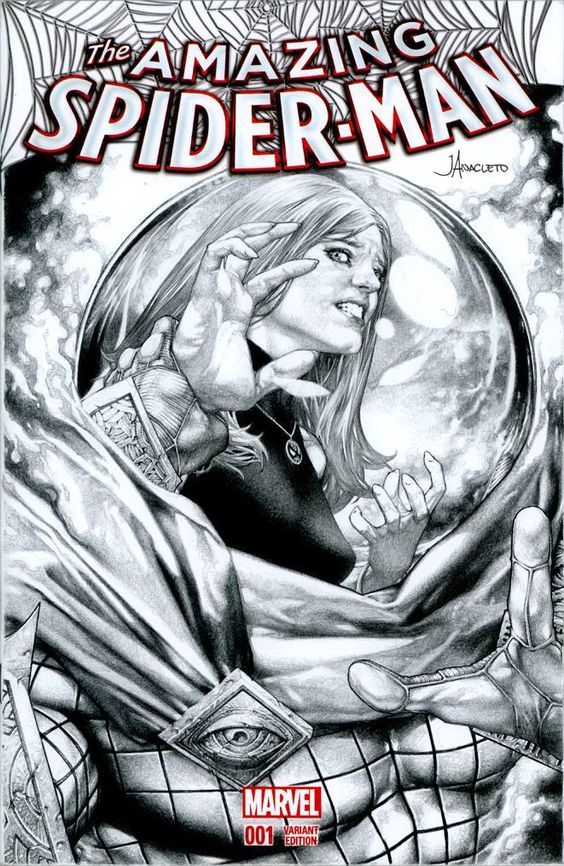
Previous Part
Next Part
Master Post
Last time I proved that, whilst not impossible, the likelihood that Mary Jane could protect herself and others from most anything Mysterio (and his crew did) was extremely uncertain. This time out I’m going to break down what MJ could try against Beck (on his own) and whether they would work.
One could argue that super hero comics are needlessly dominated by an attitude that prioritises physical might as the only options to resolve conflicts in stories, or at least conflicts with villains.
I don’t exactly agree with this but that’s a whole other debate.*
Smarts can be a superpower (just look at Reed Richards or Doctor Who). However, their usefulness as a super power varies greatly depending upon the situation. It is most certainly not innately better than any given power. In fact MOST abilities of any kind (super or not) are not innately superior to any other ability. The majority of the time it’s about how you use your talent.
However, for the sake of argument let’s take this POV as our starting point and consider the more cerebral ways MJ could deal with Beck.
Well for starters she could try to manipulate him.
In order to keep Beck under control or to give herself an opening to attack or escape MJ could always manipulate him.
She is smart, a great read of people and has some psychology training. She could empathise with him, or at least convince him she is empathising with him. Or, she could trick him into underestimating her somehow. Or she could always just use her ‘womanly wiles’ on him.
Well why not? MJ does have a certain amount of experience with wrapping men around her finger right? She could use her charming personality, beauty, etc. to manipulate him.**
But then again…he did literally say such things wouldn’t work on him in AMJ didn’t he.

But hey, maybe he’s lying or overconfident. Maybe he’s not actually beyond such things. The problem is that ‘womanly wiles’ really aren’t guaranteed to work at all. It rather depends upon MJ being Beck’s type and she has no evidence of that beyond his insistence that she have the role of his real life would-be lover. But even if she was his type, manipulating him in such a way has absolutely no guarantee of working. It’s a complete shot in the dark. In fact it’s so unreliable that most of the time Mary Jane has never utilized her ‘womanly wiles’ to escape or diffuse dangerous situations. Noticeably I never mentioned them in part 20.
More importantly we are talking about an incredibly adept manipulator who’s very good at getting inside people’s heads here. Whilst the old saying ‘You can’t trick a trickster…’ isn’t 100% true it is true that it’s rarely easy. In this case Mysterio is far more experienced at manipulating people and has done so on much deeper levels than her.
And yet in AMJ #1 there is no indication that MJ has even considered that Beck is, or could, manipulate her. In fact there isn’t even an implication that she is or (will be) trying to manipulate him, to keep him under control.
What I’m saying is MJ would have the sense to not presume she can out manipulate a master manipulator. Maybe she could. But it’s very possible that she couldn’t and the consequences could be disastrous for her and others. It’s far too much of a risk, even if we are charitable and say her chances are 50/50.
How about something else?
Could she outsmart him? Let’s say she tries to outsmart him into exposing himself or sets a trap to ensnare/subdue him. Would that work?
Well it rather amounts to the same thing as trying to manipulate him. Mysterio specialises in setting traps and the nature of his skills means it’s possible that MJ setting a trap for him could in fact be a part of a wider trap he’s set for her. Remember he fooled the Avengers, Guardians and Daredevil’s hyper senses in ASM #1; a fact MJ would likely be aware of.
And no matter what all this is heavily reliant upon MJ happening to have the time, freedom and resources to pull any of this off.
She can’t guarantee ay of that or even make it a strong possibility; especially not if Mysterio were to hypothetically employ his staff against her.
I should also mention that according to official Marvel handbook entries Mysterio is more intelligent than MJ. According to The Official Handbook of the Marvel Universe Spider-Man editions 2004-2005 MJ’s official intelligence statistic is a 2/7 and Mysterio’s is a 4/7.

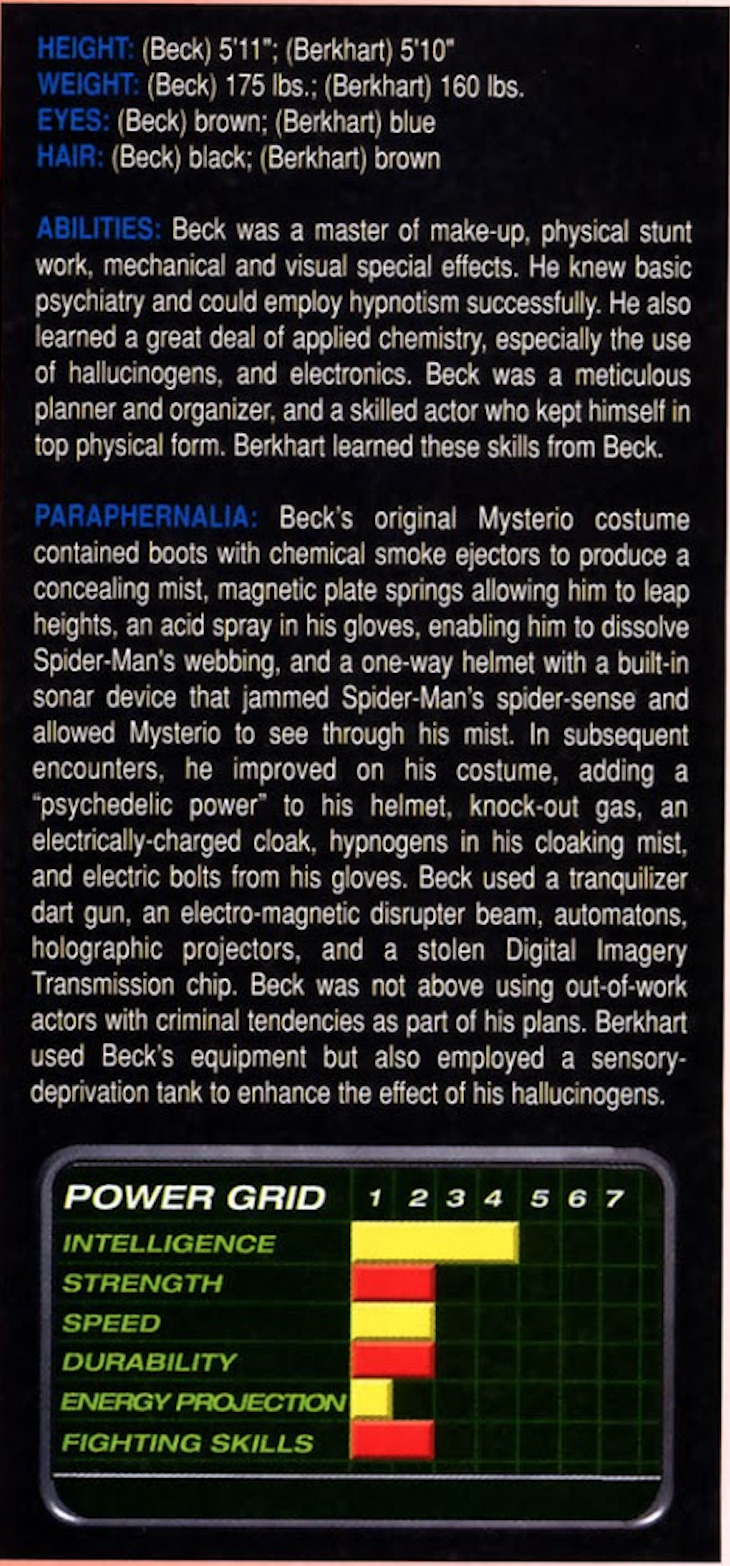
Obviously that doesn’t definitively prove anything. There are different forms of intelligence and it’s entirely possible to outsmart someone more intelligent than your self for various reasons.
In MJ’s case she is most definitely a superior improviser than Mysterio, who’s really much more of a planner and strategist. So if they wind up going up against each other out of the blue MJ would be in a better position to protect her self and possibly win.
It’s far from impossible for her to outsmart him basically. But it is also a big, big, big risk. It’s not something that she could honestly rely upon and she would know that due to her various combat experiences.
Now I’ve dispensed with MJ’s more cerebral options, let’s get more physical.
Now obviously if Beck had his criminal crew and/or his robots gang up on MJ it’d be over, but if both she and Beck were unarmed and had no protective gear then it could go either way. MJ has slugged people to the ground before but Beck (using trickery) has landed blows that have felled Spider-Man.

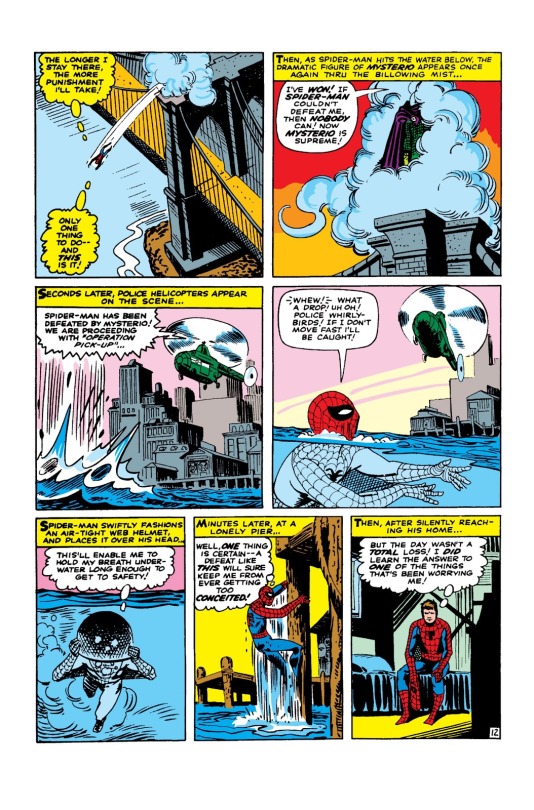
Plus Beck does have a natural height and weight advantage over MJ if you check the official stats.
If MJ had a gun or a baseball bat when Beck didn’t well then she’d probably win. But were the tables turned he’d very probably win, provided there weren’t nearby resources MJ could draw upon to help her.
If both were armed I’d actually give the advantage to MJ as she’s much more used defending herself with basic weapons than Beck is.
If MJ had her web shooters, her gun AND a baseball bat handy and Beck just had his standard Mysterio gear then he would win unless MJ got very lucky. He’s used to tangling with super powered people many of whom have sensory abilities that can (at least somewhat) mitigate his tricks. MJ not only lacks these powers but also has little-no experience fighting someone with Beck’s skills.
Over all in a one-on-one fair fight MJ stands a reasonable chance of beating Beck.
But of course…Beck’s forte is fighting unfairly.
Unless he was very unlucky or forced to he would never bother fighting without a strength enhancing suit like the one he used in ‘Guardian Devil’.
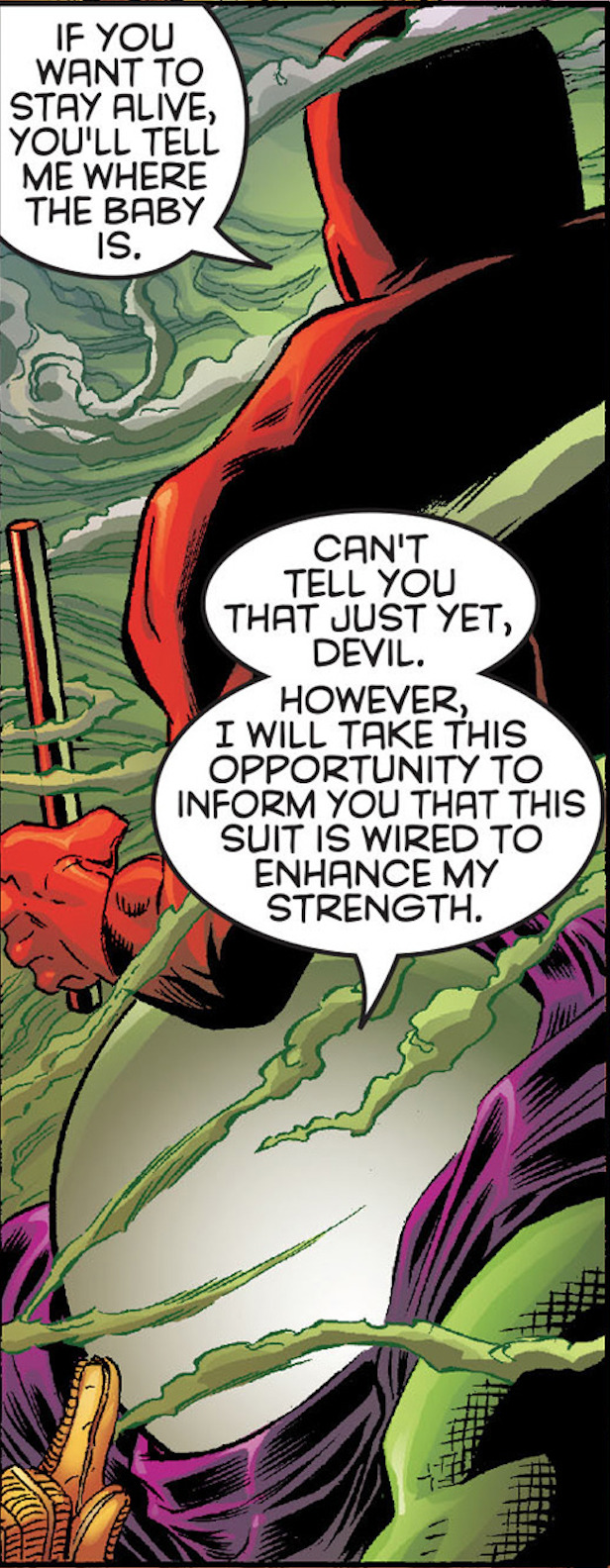
Or the assistance of one of his robots, like the ones he used in ASM Annual #1, versions of which he literally showed Mary Jane in AMJ #1.

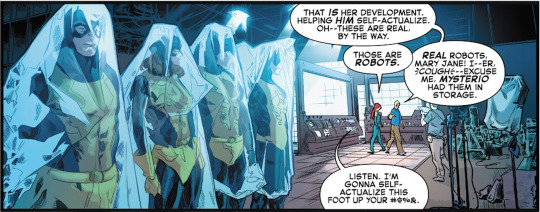
Or with any his myriad of tricks, like his optical illusions and holograms, the kind he also showed MJ in the issue.


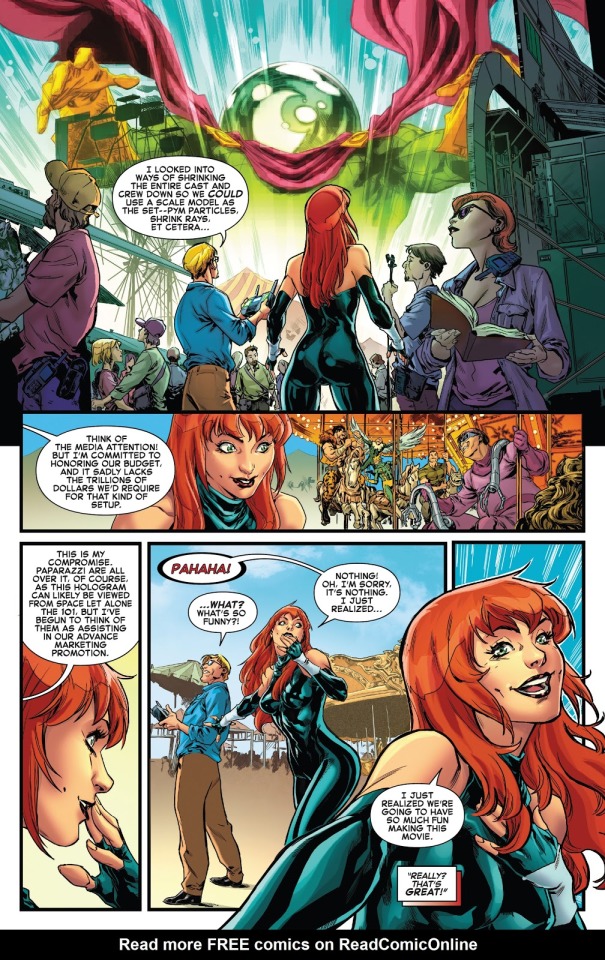
Without enhanced strength, speed, durability or sensory abilities MJ is just not going to survive (let alone defeat) anything Mysterio throws at her. Put his abilities of manipulating people aside, the guy can literally make Mary Jane see and hear things that aren’t there. He can do this even without using hallucinogenic drugs of any kind, although he does have stuff like that.
When you look at Beck’s combat history, even against civilians, he always employs his tricks. He rarely just attacks directly. A great example of this can be found in Symbiote Spider-Man #1 where Beck tries to rob a bank and uses trickery to deal with the security guard.

With this in mind even if he does underestimate Mary Jane it’s very unlikely he isn’t going to employ his tricks meaning MJ (without the fates on her side) is going to get hurt or be unable to prevent him harming others.
And that’s what these last several instalments have boiled down to.
Within the premise of Amazing Mary Jane, MJ on her own simply cannot guarantee anyone’s safety at all. She can’t even be reasonably sure she could.
And that would be fine and dandy if the situation forced her to try regardless of the odds. If she and others were trapped in a burning building and the only way out was fighting Mysterio or another villain she would more than likely try rather than wait for someone to show up and save her.
But the premise we’re given in AMJ #1 doesn’t imply anything like that. There is no hint that it’s ultimately necessary for MJ to risk herself or others. No need to try/hope she can keep him and his crew under control, handle them if they get out of hand or minimize the risk of them breaking the law once the film has finished up.
And that’s why I denounce MJ taking the risk at all (let alone justifying it on her win over Chameleon) as utter out of character nonsense.
Next time we examine MJ’s failure to alert anyone to Beck’s presence.
*I personally adore Doctor Who (even more than Spider-Man in fact) and he/she is a character that routinely resolves conflicts without throwing a single punch…Although they do often associate with people who do that for them. Or rig up a machine to blow up the threat. Or…basically the Doctor is the most famous ‘non-violent’ hero in modern sci-fi/fantasy and yet they typically directly/indirectly diffuse dangerous situations through violence; they just don’t do it through their own physical might.
I feel this is rather proof of how from a truly practical POV physical might and/or at some form of violence/ the threat of violence is usually necessary to diffuse violent situations.
**I’m not even talking about seduction by the way. Sometimes for some men the attentions and (perceived) kindnesses of an attractive woman can make them double check their actions or more open to suggestion.
Previous Part
Next Part
Master Post
#Leah Williams#Mysterio#Amazing Mary Jane#Quentin Beck#MJ Watson#mjwatsonedit#mary jane watson#Mary Jane Watson Parker#Spider-Man#Peter Parker
7 notes
·
View notes
Text
On Jane, Part 2
Actually I Mostly Talk About Rochester in This One
Greetings, pals! Today's chunk lends itself a bit more naturally to analysis, because it's primarily concerned with the development of the relationship between Jane and Rochester, concurrent with the deepening of the mystery surrounding Thornfield Hall (those 'bumps in the night' I mentioned in yesterday's post). Again, if you haven't read the book, you will probably be confused by a lot of what follows here—if you have read the book and you're still confused, I apologize. With that in mind, let's get to it.
First of all, let's talk about this Rochester fellow. By the time he actually physically enters the picture, we know very little about him. He's not a titled peer, but he's evidently wealthy enough to spend most of his time traveling around Europe. He's apparently well-liked by his tenants and employees, though Mrs. Fairfax (so far, the chief source of information for both Jane and the audience) makes a reference to his eccentric personality. Beyond that, he's an unknown quantity.
When Jane first sees him charging down the icy lane on his black horse, she thinks of a mystical creature, the Gytrash, known to haunt solitary lanes at nightfall. During their first real conversations, Rochester teasingly accuses Jane of bewitching his horse, asking if he had broken through a fairy-circle. These particular scenes are some of my favorites, because they give such a clear idea of both characters. For his part, Rochester addresses Jane as a person, with thoughts and opinions worth hearing. And Jane rises to the occasion, frankly and innocently answering his questions. In the second conversation, when Rochester asks if Jane finds him handsome, she answers ‘no’, not out of any intent to insult, but out of simple honesty. Rochester pretends to be piqued, but given the way the rest of the conversation proceeds, it’s clear that he finds her candor admirable, even as he pokes fun at her naïveté.
For a while, not much happens. Winter thaws into spring, and Rochester and Jane’s conversations deepen. He tells her the rather Romantic story of Adele’s parentage—himself, the young wastrel, seduced by the feckless showgirl Celine Varens. But the anecdote is revealing. Despite his professed lack of enthusiasm for the company of children and his rather dismissive attitude toward Adele herself, he nevertheless rescued her from a probable grim fate. In Paris, Adele was the illegitimate daughter of a woman who was about one rung up the ladder from a prostitute. In England, she is being raised in a comfortable home, and educated as a member of the upper classes, no doubt with an eye toward a future advantageous marriage, as long as nobody asks too many questions. One could argue that Rochester’s actions in this case constitute the most basic level of human decency, but within the context of the story, wherein children are either spoiled rotten or cast off and starved, Rochester comes off looking like quite the benefactor.
(I could derail this into a Whole Thing about the trend of novels in the 19th Century still functioning largely as allegory and not precisely meant to represent the Real World—Dickens, Thackeray, Hardy to an extent, and of course Wuthering Heights, but I feel like that deserves further and better research than what I’m going for here. Still, I think it’s another thing that often gets missed in discussions of this novel, and thus, the more melodramatic elements of the work seem incongruous with its overall ‘realistic’ tone.)
Now, a bit more on those bumps in the night. Ever since Jane’s earliest days at Thornfield, she’s been aware of an eerie laugh issuing from some rooms on the third story of the house. There is a servant who stays there, rarely venturing down to the rest of the house, and her name is given as Grace Poole. Everybody seems rather vague on the subject of what Grace actually does, and Jane, being observant, begins to suspect that there is something going on with Grace, despite her thoroughly ordinary appearance and taciturn manner.
These suspicions come quite literally roaring to life one night, when Jane hears that laugh in the hall outside her bedroom, and ventures outside to discover that Rochester’s room has been set on fire. Jane runs in and douses him with water, and once he is aware of the situation, he dashes off, telling her to stay there and wait until he returns. The bit that follows his return is an interesting one—Rochester urges Jane’s silence, and confirms Grace Poole as the owner of the laugh, terming her a ‘singular’ (here meaning odd) person. Jane begins to leave, but Rochester detains her for a second, sincerely thanking her for saving his life, and speaking to her in his fondest tone yet. This instant marks another significant step in Jane’s ascension—she is not just Rochester’s ‘paid subordinate’, she is his confidante and quite literally his savior. The incident has bound them together in a way neither of them understands just yet.
And this closeness is seemingly dashed the next morning, when Jane is informed that Rochester has gone off to visit some friends, and will likely not return for several weeks. When he does come back, he is accompanied by a full complement of guests, including the imposing, imperious Miss Blanche Ingram, who Rochester is rumored to be courting as a future bride. At first, Jane is crushed—Blanche has money, beauty, accomplishments, and power. Again, this could be a jumping-off point for a discussion about how marriage among the upper classes at that period of time still hewed fairly close to its feudal roots, more as a way of securing finances than as an expression of emotional attachment. But you can read Jane Austen for that. In this case, Blanche wanting to marry Rochester for his money isn’t quite as much of a stain on her character as it might seem to a modern reader. Her vanity and coldness, however, serve as kindling for Jane’s feisty side—at one point, she dismisses Blanche as ‘a mark beneath jealousy’.
Another strange incident occurs after the guests have been staying at Thornfield for quite some time. Mr. Rochester leaves on some errand, and in his absence, a stranger shows up at the house, claiming to be a friend of Rochester’s. He is described as around thirty-five, dark-haired and handsome, but somehow deficient. Jane gives particular attention to his ‘wandering eye’ and his peculiar accent. We soon learn that his name is Richard Mason, and he has come all the way from Jamaica to pay a visit to his ‘old friend’.
In the interest of keeping things moving, I’m not going to discuss the business with Rochester in disguise as the fortune-teller. Once he unmasks himself before Jane, and she informs him of Mason’s arrival, we see a reaction in him we haven’t seen before: fear. He begs Jane for comfort, asking her what she would do if the assembled company suddenly turned against him. Assured of her fidelity, he rejoins his friends and apparently greets Mason calmly enough.
Once again, however, Jane is awakened by noises in the dark—screams, this time, from the regions where Grace Poole keeps her dark vigils. In due course, Rochester summons her. The newly-arrived Mr. Mason is lying injured in an upstairs room, and Rochester enlists Jane to keep watch while he fetches the doctor. He orders Mason not to speak to Jane, which, considering that the guy’s barely conscious, doesn’t seem like a difficult request to fulfill.
Rochester and the doctor return, and it’s revealed that Mason was bitten, as well as being stabbed with a knife. Once Mason is fixed up enough to leave, Rochester sends him on his way, but not before a brief, fraught conversation, in which Mason begs him to take care of Her—that mysterious inhabitant of the upstairs room. Rochester tersely replies that he has done his best, and will continue to do it.
Rochester then summons Jane into a garden, and attempts to unburden himself to her. He alludes to his past misdeeds, without giving much in the way of satisfactory detail, and testifies to his sincere wish for his own redemption. He tells her, finally, that he thinks he has found it… in Miss Ingram. He calls her his ‘lovely one’, and suddenly becomes cheerful and jocular. Neither Jane, nor the reader, is satisfied by this.
This brings us nearly to the end of the book’s actual first volume, and (more to the point) near the end of this installment of my…whatever this is. I also think I’m going to need to do two more of these, rather than just one, like I’d originally planned. I’m assuming that if you’ve gotten this far, you’re just as invested as I am.
There is one more major occurrence: the illness and death of Jane’s Aunt Reed. Bessie, Jane’s old nurse, comes to inform her that Mrs. Reed has suffered a stroke, but has been asking for Jane. Jane pays one last visit to her former childhood home, to find it greatly changed: her cousin John has committed suicide, Eliza has become a religious obsessive, and Georgiana is a hapless social climber (though it’s worth noting that she treats the adult Jane with a certain friendliness). And what of Aunt Reed? Before she slips off her mortal coil, she passes Jane a vital piece of information—Jane has a rich uncle from her father’s side, a wine-merchant in Madeira, who has asked for information on Jane’s whereabouts, with a view toward making her his heir. Jane, for her part, offers her aunt her forgiveness, and in this way, seals off that portion of her past.
In tomorrow’s recap, we’ll get to the really juicy stuff. For anyone who’s reading along, thanks a bunch, and feel free to come tell me your thoughts. For anyone who missed yesterday’s, Part 1 is here: http://penniesforthestorm.tumblr.com/post/176721452934
1 note
·
View note
Text
Is the Internet Conscious? If It Were, How Would We Know?
SUPPORT REQUEST :
From : [ 422 ] UNPROCESSABLE ENTITY
There’s a lot of discussion about artificial consciousness and the possibility of machines gaining self-awareness once they become sufficiently complex. But isn’t the most complex system in existence the internet? Is it possible that the internet could become conscious, and if it were already, how would we know? Also, why aren’t more people talking about this?
CLOUD SUPPORT
For assistance with your personal problems, moral dilemmas, or philosophical concerns about encounters with technology, open a support ticket or post a comment below.
Dear [ 422 ] ,
Your question brings to mind Balk’s Third Law: “If you think The Internet is terrible now, just wait a while.” Logging on already provides a daily megadose of paranoia (mass surveillance), epistemic vertigo (deepfakes), and fremdschämen (thirstposting). Imagine the day when this colony of horrors becomes unified, intentional, and self-aware. I say this not to alarm you, only to suggest why the prospect of a conscious internet isn’t often discussed. The information age (if that’s still where we are) constantly reminds us of the many grim scenarios that await us—floods and famine, red giants, gray goo. I don’t think people have the bandwidth, so to speak, to take on yet another existential threat.
But as you appear to have a higher-than-average tolerance for psychological torment, I will try my best to answer honestly. Consciousness, of course, is notoriously difficult to pin down. You can’t measure it, weigh it, or hold it in your hand. You can observe it directly in yourself, but not in others.
This is not a technical problem, or even a modern one. Christ seemed to discern the slipperiness of the psyche when he told his disciples, “You will know them by their fruits,” meaning, essentially, that the only way to determine the state of another person’s soul is through its outward manifestation: behavior. Philosophy and artificial intelligence tend to circumnavigate the Problem of Other Minds in a similar manner. Alan Turing constructed his famous criteria for machine intelligence, the Turing Test, on the assumption that the mind is a black box. If a computer can convince us, through its actions, that it has human-level intelligence, we must assume that it does.
So perhaps we should reformulate your question: Does the internet behave like a creature with an internal life? Does it manifest the fruits of consciousness? There are certainly moments when it seems to. Google can anticipate what you’re going to type before you fully articulate it to yourself. Facebook ads can intuit that a woman is pregnant before she tells her family and friends. It is easy, in such moments, to conclude that you’re in the presence of another mind—though given the human tendency to anthropomorphize, we should be wary of quick conclusions.
Some of the more convincing evidence for internet consciousness might be difficult to perceive, since we ourselves would be the nodes and neurons that constitute the brain. For some social scientists, the many political movements that have originated on social networks qualify as “emergent” behavior—phenomena that cannot be attributed to any one person, but belong to the system as a whole. Two French cognitive psychologists have gone so far as to claim that the Egyptian Revolution and the Arab Spring were evidence of Virtual Collective Consciousness, which they describe as “internal knowledge shared by a plurality of persons.”
I imagine you don’t find this very convincing, nor should you. When we speak of consciousness, we usually mean something more cohesive: that singular stream of mental experience—the ego, the self—that would seem to be more than the sum of all Twitter posts. You asked, after all, about “self-awareness.” Some very smart people have argued, of course, that our own self-awareness is an illusion. The intuition that we are, as Richard Dawkins once put it, “a unit, not a colony” is not really supported by the architecture of the brain, with its billions of tiny, unconscious parts. But such dismissals of subjectivity aren’t very illuminating or precise: If a unified mind is nothing more than an illusion, where does the illusion come from? And how do we know whether other things have it too?
As it happens, one of the most convincing cases for internet consciousness stems from a theory of mind that was developed to account for precisely this kind of unified experience. Integrated Information Theory, pioneered by Christof Koch and Giulio Tononi, holds that consciousness arises from complex connections across different regions of the brain.
0 notes
Text
REED RICHARDS: A DEFENSE, PART ONE
Because I have just seen someone actually blaming Reed for the space-flight accident that gave his family powers, and I am floored that anyone could be so infuriatingly ignorant of Fantastic Four canon, let’s get a few things straight, followers:
Reed did not “force” anyone to go with him on that spaceship. There is absolutely no evidence for that ANYWHERE in canon. None of the various revamped origin stories allow for that interpretation.
In Fantastic Four v1 #1, Sue, for one, is depicted as willingly accompanying Reed out of a sense of love and loyalty but also patriotism – she wants the US to beat Russia to the moon. Johnny goes because Sue does, and where his sister goes, he follows. Ben goes because of his own toxic masculinity, because Sue calls him a coward, and Ben – who was already a decorated war hero – felt the need to prove her wrong. Could he not simply have pointed to the WWII medals on his wall, or explained that he is an experimental test pilot, which requires a fair amount of bravery?
And can I point out that it’s been canon since Fantastic Four v1 #1 that Reed tried to talk BOTH Sue and Johnny out of going because he and Ben were experienced at that sort of thing and they weren’t, but Sue and Johnny both insisted on going despite Reed’s warnings? Where from these panels does anyone get “HE FORCED THEM TO GO OMG HE’S SO AWFUL”??? I am truly baffled at how anyone can read these panels and see that. They all had their own reasons for going. No coercion was involved.
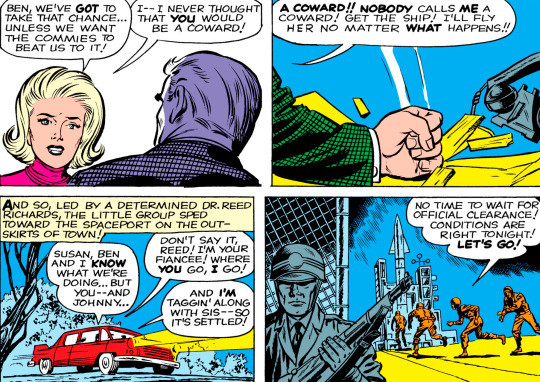
If you are going to accuse a character of something, you might want to, I don’t know, actually read the story in question. Just a suggestion.
More beneath the cut!
As a matter of fact, Fantastic Four: The Wedding Special makes clear that Sue’s adventurousness had much to do with encouraging Reed to leave the lab, and that without her egging him on, he never would have dared try to steal the spaceship. Reed, nevertheless, tried to convince her not to go:
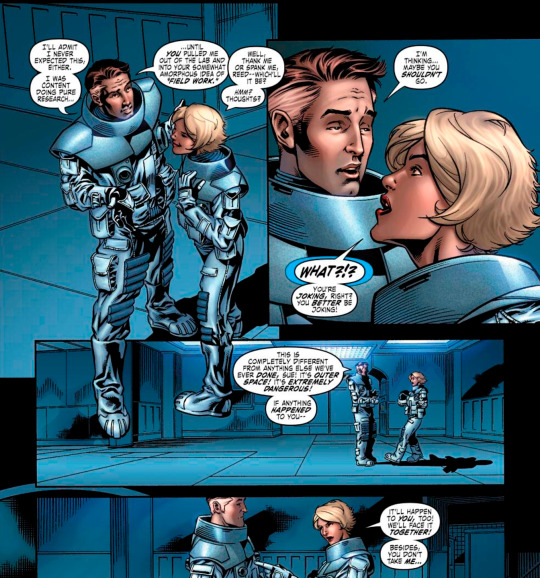
What do the Reed haters want Reed to have done, deprive Sue of her right to make her own decisions by knocking her out and tying her up so she couldn’t do as she wished? I can see that the anti-Reed crowd is a HUGE proponent for female agency and autonomy. /sarcasm
Sue went on that spaceship because SHE wanted to. She was bored with her life, she wanted an adventure, and, suffice it to say, she got one. The adventure of a lifetime. Reed did not force her to do anything, for fuck’s sake. He simply respected her decision – and the fact that it was her decision to make – which is more than I can say about the anti-Reed crowd. When even a male character from the 1960s is more of a feminist than you are, you know you’re pretty damn sexist.
Personally, I hate it when people pretend that Reed forced Sue to tag along because it very misogynistically erases the fact that Sue loves exploration and discovery every bit as much as Reed does, if not more. People who make that argument do not understand Sue or her motivations in the slightest and are doing her character a great disservice, unsurprising since they clearly do not understand Reed either, and, I suspect, have never cracked open a Fantastic Four comic in their lives, since they do not know even the basics about Reed and Sue’s lives and personalities. Sue goes on adventures with Reed because she loves them, him, and believes in what he’s doing, in their joint project — trying to make the world a better place through a combination of scientific advancements and philanthropic endeavors. So stop underestimating and mischaracterizing her.
Let me also point out that it’s been canon since Fantastic Four v1 #2 that Reed feels TREMENDOUSLY guilty over the accident, even though, again, IT IS NOT HIS FAULT.
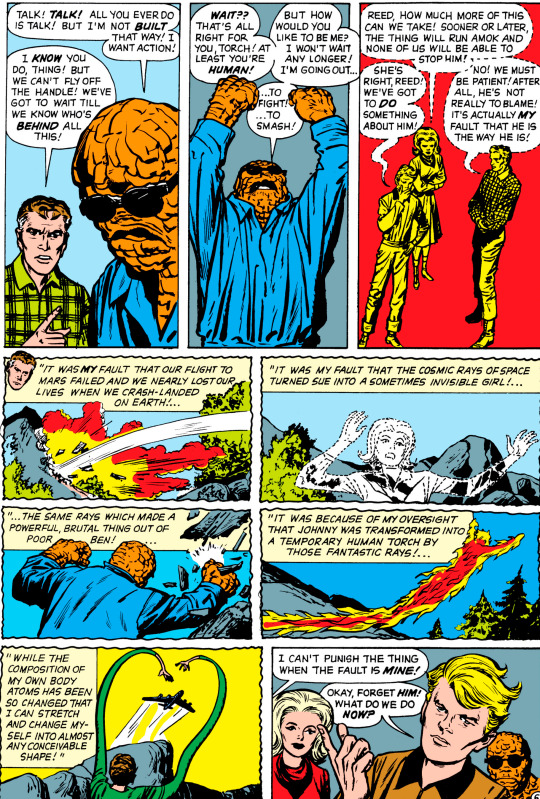
People. There is a huge difference between a character BELIEVING something is their fault and it actually BEING their fault. Why is it that so many people seem incapable of telling the difference?
Reed feels so guilty over the accident, in fact, that no matter how emotionally or even physically abusive Ben becomes towards him, Reed simply accepts it and doesn’t even try to defend himself, because he honestly believes he deserves the punishment, as we see in Fantastic Four v1 #66:

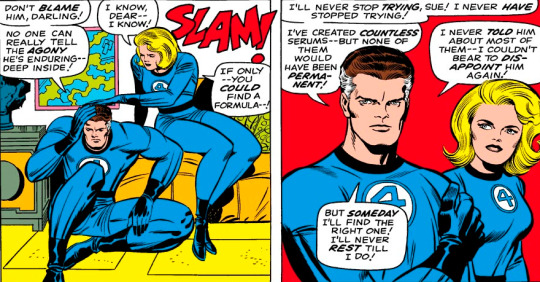
Reed, there is a point where you stop being responsible for Ben’s actions, and that point is when he starts physically assaulting you.
But, then again, that’s who Reed is. What he does. Takes responsibility for everyone and everything around him, as he makes clear in Fantastic Four Special 2005:

That is a line that sums Reed up fairly perfectly.
I think people miss that Reed takes responsibility for all of the FF in ways they’re not necessarily even aware of. In Thing v2 #1, Reed tells Johnny that he’s ensured that Ben’s always lived like a millionaire, even if Ben didn’t know it:
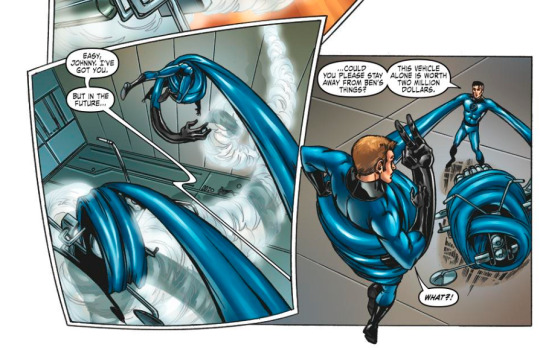

And in Marvel Two-In-One v1 #37, after the FF has temporarily broken up, Ben’s arrested for destruction of property and sent to jail, and we discover that the only reason he hasn’t been in the past is because Reed stepped in and paid for all of the damages, every time. He protects Ben as best he can, and kept him from being sent to jail long ago and treated like a monster. Without Reed’s protection and support, Ben is ostracized and imprisoned and treated like a monster.
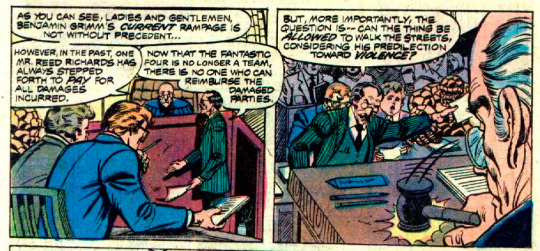
And we see Reed’s guilt crop up again in Fantastic Four: First Family, which takes place immediately after the crash. Reed is so traumatized by the accident and paralyzed by his guilt that he is catatonic for days:
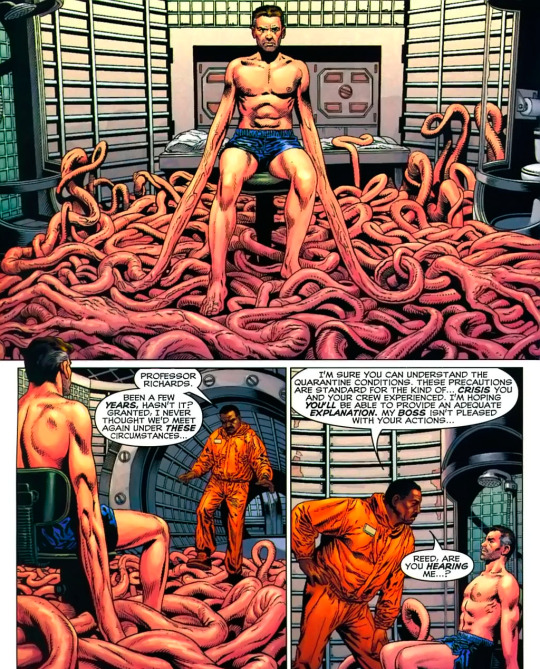
until he sees another inmate of the military prison he and his family were taken to killed in front of him and realizes his life and his family’s are all in danger:
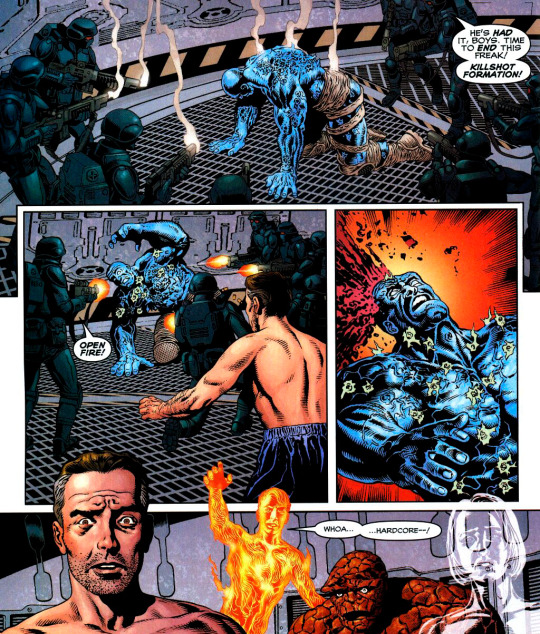
and then he immediately tries to behave as nonthreateningly as possible, even apologizing for his “off-putting” catatonia:

But he does take the time to beat himself up over the accident:

Reed understands, the moment he sees the other inmate murdered, that he and his family are going to be considered non-human “freaks” by unsuperpowered humans. He understands that he needs to protect his family, and that’s what he does. He makes them heroes, makes them celebrities, so the world will be able to look past the terrifying powers and see who they really are – the best and bravest people Reed’s ever known, which he says in Fantastic Four v3 #60. This is where Reed explains that his entire life — everything he ever does — revolves around protecting his family and ensuring their happiness. He tries to keep them wealthy and famous and give them everything they could ever want because he loves them, but also because of his guilt, because he cannot bear the knowledge that he has, as he sees it, destroyed their lives and put them all in constant danger:
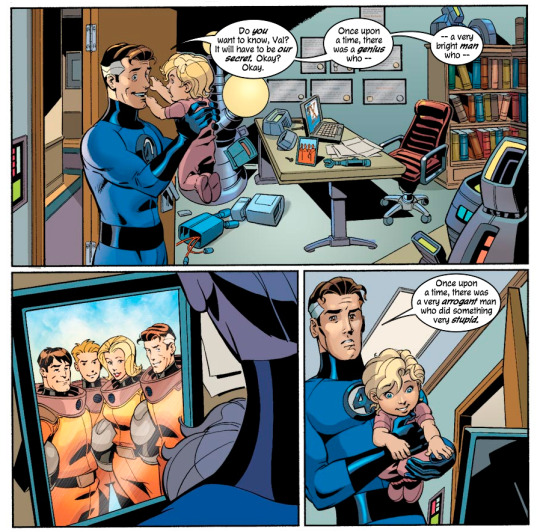

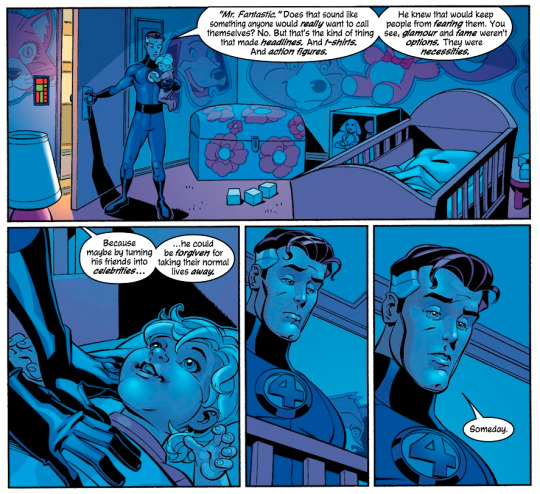
People miss — people always seem to miss — that Reed thoroughly despises himself for what he perceives as his many failures, chief among them his failure to protect his family during the space-flight accident. Reed’s guilt isn’t an invention of Mark Waid’s, either, as I’ve seen people argue -- it’s been canon almost as long as Reed has existed. It is even, I’d argue, one of his chief motivations for his superheroics and virtually everything he does.
Honestly, I could pull dozens if not hundreds of panels that span the breadth of over fifty years of Fantastic Four canon that demonstrate that Reed never forced anyone to go on the space flight with him, that the crash wasn’t his fault, that he feels deeply guilty about it regardless of that fact, and that he has dedicated his whole life to making amends for something that he had no control over and was just as much a victim of. If you don’t understand that Reed hates himself and blames himself for the space flight accident, my god, you do not understand the first thing about Reed Richards. The Reed Richards you are describing — a man who would EVER force the people he loves to do anything against their will — simply does not exist in the pages of Fantastic Four comics. He is purely the product of your imagination.
So, for fuck’s sake, stop demonizing Reed over something for which there is zero, I repeat, ZERO canonical evidence. If you don’t believe me? Go read Fantastic Four comics and try to find a SINGLE, I mean just ONE, moment in canon that even so much as implies that Reed did any of this on purpose, or that he is in any way glad that it happened. I challenge you to do so, but I assure you, you will not find it. I mean. There is literally a comic – Fantastic Four vs the X-Men – that floats the idea that Reed possibly engineered the space-flight accident on purpose, but it turns out that it was all part of a trap set up by Victor Von Doom. So the idea has been presented in canon and thoroughly debunked. In other words, you are dead wrong – even laughably so, for people who have actually read the damn comics, which I am so very sure you have not – so, again, stop accusing Reed of something he very definitely did not do.
Part Two, or ‘Sue Very Definitely Loves Reed And Does Not Just Stay With Him Because Of The Kids,’ may be following shortly. How does Part Three, or ‘Why Victor Von Doom, Tyrant, Mass Murderer, Torturer, and Rapist, Is Definitely A Worse Person Than Reed Who Is None Of Those Things, AKA, I Can’t Believe I Actually Have To Say This, What’s Next, Why The Red Skull Is A Worse Person Than Captain America?’ sound?
#fantastic four#reed richards#mister fantastic#susan storm#johnny storm#ben grimm#invisible woman#the thing#human torch#comics#mod: lamujerarana#if you find someone making this argument#either point me in their direction#or just copy/paste this link into a reply#i don't mind#but i am very sick and tired#of this nonsense argument#prime marvel universe
67 notes
·
View notes
Text
first you get hurt, then you feel sorry
fandom: the raven cycle
pairing: ronan lynch/adam parrish, and probably blue sargent/richard campbell gansey iii/henry cheng
sort of trading spaces au wherein ronan is poor and adam is rich (and that’s basically it) and also super depressing
heads up - i wanted to play trading places with Ronan and Adam but still figure out a way for them to retain some of themselves and also become completely out of character - sorry for making Adam suffer even more than he already does (he’s low key suicidal and it isn’t my intention to romanticize this but he never actually is full on suicidal, he’s just a character on the edge out of necessity for a maybe plot)
also, this currently has little to no plot and is merely an exercise in what may become a full fic if i can figure out what situation to put my lovelies in that isn’t just the plot of the books - it’s an au for a reason - and is also basically just random chunks of moments with no set up whatsoever and no timeline
any feedback is greatly appreciated (even in the form of a like, i ain’t picky)
** the two highlighted quotes about the sins of the mother/father are from the merchant of venice (shakespeare) bc i like being that asshole
excerpt:
It’s not the first time Adam has shown up to one of their research meetings/friendly neighbourhood gatherings at Monmouth with a bruise, however, they’re usually below the collar of his shirt - hidden in plain view. Gansey gapes for a second before composing himself, frowning at Adam though not actually at Adam.
“I tripped.”
Gansey grits his teeth but says nothing, jerking his head towards the fridge where a bag of ice awaits his cheek.
“Fucking idiot. Walk much, Parrish?” Ronan scoffs and yet Adam is completely aware that Ronan is calling him on his bullshit excuse, his raised eyebrows reading your dad’s a cunt. All the money in the world couldn't buy him better parents, apparently. Unlike the Ganseys, the Parrish money and name were never earned honestly and Adam suffers for his father’s transgressions, his insatiable greed.
The sins of the father are to be laid upon the children.
They end up, as they usually do on a Friday evening, at Nino’s with a grossly large pizza in front of them. A girl with pins holding her hair up with sheer willpower dropped it off to their table with a look of disgust that could only be attributed to the whole teenage-boy species. Her eyes shift momentarily to Noah, squinting, and then she disappears once again.
Gansey is blissfully ignorant (by choice of course) of the fact that Noah a) can’t eat pizza, and b) goes largely unseen by the general populous. So, as usual, Adam and Gansey suffer through half the pizza while Noah stares on wistfully. It’s routine, and deathly boring, but Gansey’s research on Glendower has reached a grinding halt in production. They’re saved from boredom by the arrival of Gansey’s new pet project Ronan Lynch, stray if you will, showing up and falling gracelessly into their booth. He grabs a slice of pizza with a grunt of acknowledgement while Gansey grins like an idiot.
“You weren’t at school today.” Adam’s already testing the waters with Ronan just by existing, but if there’s one thing he’s abnormally good at it’s pushing peoples buttons (usually unintentionally).
“Fuck off Parrish, not everyone jerks it to school books like you do.” Adam blushes furiously to his own dismay and promptly kick his heel back at Ronan’s shin.
The only reason Ronan is even at Aglionby is because of Declan, funding his education out of his hard-earned cash. He’s still at Aglionby, however, because of Gansey. Hand-outs don't seem to bother Ronan the way they probably would bother Adam if their roles were reversed.
“Ronan.” Dad-Gansey bites, the smile wiped off his lips and replaced by a disdainful frown.
“Work was fuckin’ garbage, Dick, so fuck me for not radiating sunshine and rainbows.” He’s covered in grease and still wearing his coveralls, and he too is frowning but without a general target - perhaps the world, if Adam were to guess.
It’s not the first time Adam has shown up to one of their research meetings/friendly neighbourhood gatherings at Monmouth with a bruise, however, they’re usually below the collar of his shirt - hidden in plain view. Gansey gapes for a second before composing himself, frowning at Adam though not actually at Adam.
“I tripped.” Gansey grits his teeth but says nothing, jerking his head towards the fridge where a bag of ice awaits his cheek.
“Fucking idiot. Walk much, Parrish?” Ronan scoffs and yet Adam is completely aware that Ronan is calling him on his bullshit excuse, his raised eyebrows reading your dad’s a cunt. All the money in the world couldn't buy him better parents, apparently. Unlike the Ganseys, the Parrish money and name were never earned honestly and Adam suffers for his father’s transgressions, his insatiable greed.
The sins of the father are to be laid upon the children.
He sighs and immediately regrets it, the pain in his ribs flares up angrily, and he walks to the fridge to grab some ice, gritting his teeth. Ronan watches him, his gaze heavy with meaning that Adam doesn’t want to unravel just yet - want, desire, and pure, unadulterated concern. His gaze is combustible, a spark turning to flame.
He doesn’t have the energy to let someone love him, doesn’t have the time to understand why someone could love him. Ronan is an enigma hidden beneath alabaster skin, jet black ink, and engine grease-stained leather.
He studies, handles his fathers books, researches for Gansey, handles his mother, studies, endures his father, and sometimes finds the space to eat and sleep in between. Whoever said the rich had it all surely never intended to include what Adam has. He’s permanently exhausted in a way not unlike Ronan is - insomnia biting at his heels and aching muscles beneath his skin. They would make quite the pair - like a pair of horror movie twins, two sides of the same tarnished coin.
Noah flits into the space next to him, breaking his thoughts, sliding his cold hand over his ribs, a pout evident on his smudged lips.
“I’m okay Noah, really.” His weak response is accepted but not agreed with as usual.
Gansey has long since stopped begging Adam to leave his parents house, already having ditched the need for Adam to move into Monmouth months prior - he suffers a gnawing guilt-complex stoked in his youth when his father told him, convinced him, that he made his mother sick and vacant. Her gaunt figure and glazed over eyes are every bit his responsibility. She hasn’t been the same since he was born and he bears that guilt like a boulder upon his back, ever-growing. Atlas has nothing on Adam Parrish.
He has shared most of this with Gansey, however, he also stands rooted in place for another reason. His father owns a gun, owns several in fact, and his father doesn’t like to give up his things. Adam will die before he leaves his fathers home.
If anyone had to ask, spared the ear to listen closely, they would hear the aching brag of his heart - beating on relentlessly without purpose. He can’t even argue that his actions are performed out of love anymore. He hasn’t loved his mother since he was five and old enough to understand. His ‘mother’ is an empty, unholy creature chained to the devil. He used to pity her - there isn’t enough of her left to pity. She’s a shell.
He remembers their last fight like he remembers to breathe. Reluctantly. And yet the memory persists. His mother had a bad day, the ratio of bad to ‘good’ days getting further and further apart lately, and he was blamed - he hadn’t been home, either, when his father arrived and that had made him more furious, perhaps, than anything else.
Like clockwork, he apologizes for being alive and endures the hand of his maker and unmaker. Every blow feels like his undoing and yet, and yet, he persists like a weed through pavement - unwanted but needed.
So the sins of my mother should be visited upon me.
#trc#trc fic#pynch#sarchengsey#bluesey#the raven cycle#my writing#i want kavinsky to fit into this but idk where and how#actual trailer trash kavinsky maybe#there are so many easter eggs here from the series bc im not original whatsoever#trc au#au#trading places au#pynch fic
4 notes
·
View notes
Text
Movie Mania: Top 15 of 2016
The first month of 2017 is nearly over, so what better time to release my best of 2016 list? What started out as a pretty sparse year for film quickly turned into one that churned out hit after hit. We can only hope that 2017 matches or exceeds the level of quality films that the last few months of 2016 produced.
This is the first time I have ever published a best of list, so I am excited to jump into it. My hope is that this list will shine a spotlight on some of the lesser-known films of the year and pique your interest in some of the bigger films that you may have missed. Read ahead confident that there will be no spoilers.
Honorable Mentions
Hidden Figures
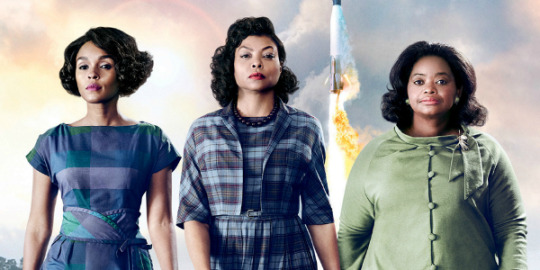
What’s not to like about this endearing, educational biographical drama? Based on the nonfiction book of the same name by Margot Lee Shetterly, this film follows the story of three African-American mathematicians who work at NASA in the 1960s, when racial segregation was sadly still prevalent. Taraji P. Henson as Katherine G. Johnson and Octavia Spencer as Dorothy Vaughan are outstanding and bring so much energy and personality to the screen. Whereas this film could have been bogged down by complex mathematics and literal rocket science, Theodore Melfi expertly directs the film so that it is fast-paced and accessible, and while he acknowledges the racial prejudice of the time, he does not let it dilute his main story. Melfi and Allison Schroeder’s screenplay delivers witty and memorable dialogue throughout the film that feels natural to the characters.
Hans Zimmer returns to another space-related film to compose the score, but Pharrell Williams’ music really takes center stage. “Runnin’,” “I See a Victory,” and “Crave” are all great bets for your music playlist. Best of all, this film teaches audiences about historical figures that they would be hard-fought to discover in standard history textbooks, making it a film that should be shown in school classrooms throughout the country. While not really a negative, the film does slow down when the three women leave NASA after a long workday and return home to their families. As a biographical drama, the film is responsible for showing us different parts of these extraordinary women’s lives, but you are left waiting for them to go back to breaking barriers at NASA.
Rogue One: A Star Wars Story

Ah, my beloved Star Wars. How I wish this film could have actually made it onto my list! I will be the first to admit that I am biased as a Star Wars fan, so that may be why this film even gets an honorable mention nod. When Star Wars: Episode VII - The Force Awakens came out in December 2015, I saw it on opening night and three or four times after that before it left theaters. By contrast, I saw Rogue One on opening night and have not seen it since. No one can accuse me of not being excited for Rogue One, and I tempered my expectations by avoiding any and all reviews before seeing the film. I even read the canon Catalyst: A Rogue One Novel by James Luceno to learn about the backstories of Orson Krennic and the Erso Family before seeing the film.
Without spoiling anything, the weakest facet of Rogue One is its lack of character depth and development. I did not really care about most of the rebels in the film; in fact, there were a couple of parts where I was actually cheering for the Empire! I will say that Alan Tudyk was great as K-2SO with his dark comedic humor and Donnie Yen was a badass as the blind Chirrut Imwe, but when the droid has the most personality out of the bunch, you have done something wrong.
On the other hand, the cinematography proves to be Rogue One’s strength. Never before, not even in the original trilogy, have we truly experienced what it feels like to be a world occupied and controlled by the Empire; Rogue One does an amazing job showing the reach and power of the dreadful Empire. New planets like the tropical world of Scarif look beautiful. Additionally, Rogue One includes the first true space battle we have seen in a Star Wars film since the beginning of Episode III – Revenge of the Sith. It is a sight to behold, and the new ships and tactics used by the Rebellion are quite the thrill. Director Gareth Edwards does a great job with the space battle; it never feels too cluttered or hard to follow with choppy editing. Finally, who can forget THAT scene in the last ten minutes of the film?
I appreciate the novel approaches and risks the creators of Rogue One took. I enjoyed the references to other canon material like the animated television show Star Wars Rebels for fans like me who have cared to invest in them. However, this film has proved to me that Star Wars needs strong, fully-developed characters to succeed. It makes me wonder what Rogue One looked like before those infamous re-shoots.
Game of Thrones: “The Winds of Winter”

I know, I know. This pick is not a film; it is a television episode. That is why it is only listed among the honorable mentions. Let’s face it, though. Game of Thrones is practically a ten-hour film each season. The quality, scope, and budget of many of the episodes easily surpass those of several films. While “Battle of the Bastards” was outstanding in its own right, “The Winds of Winter” is my pick for the best episode of season six. The season six finale delivers on so many fronts for long-time viewers of the show after what can be argued was a very up-and-down season, and it is rich with emotion, suspense, and superb acting. What fan of the show did not get goosebumps and/or tear up when that music swelled up in the final scene of the season, and wasn’t that “Light of the Seven” piano piece at the beginning of the episode so chilling? I cannot really say more without treading into spoiler territory, so do yourself a favor and go watch (or re-watch) this masterful episode of television.
#15: Deadpool
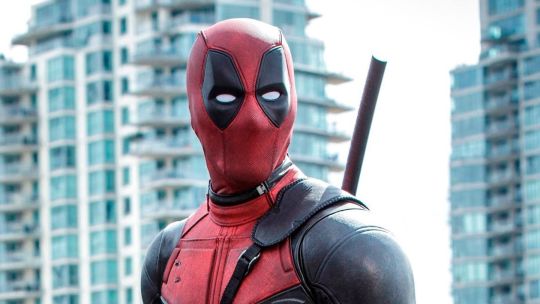
Can we all extend a big thank you to Ryan Reynolds? His enthusiasm and dedication to the character of Deadpool may have been the sole reason this film was made. Thank goodness that test footage was “leaked” to the public! This Deadpool is a far cry from that unspeakable depiction in X-Men Origins: Wolverine. (Who thought it was a good idea to sew the Merc with a Mouth’s mouth shut?) From the opening credits, this film promises that it is self-aware and ready to break the fourth wall, true to its titular character. Deadpool embraces its R rating and runs with it. The crass humor and the no holds barred action scenes are great fun, and Deadpool’s interactions with Negasonic Teenage Warhead and Colossus supply some rib-busting laughs. (Deadpool at Xavier’s Mansion: “It’s funny how there’s only ever two of you. It’s almost like the studio couldn’t afford another X-Man.”) At a time in cinema where comic book films are a constant, Deadpool brings a refreshing breath of fresh air to the genre.
#14: Manchester by the Sea
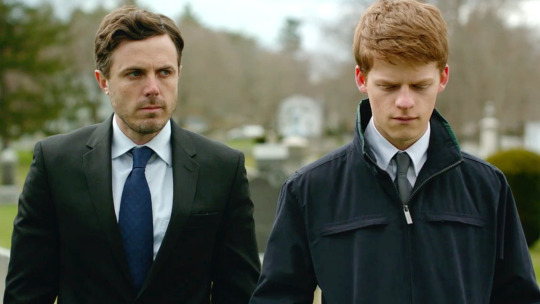
Warning: This film is very sad and heavy. However, writer and director Kenneth Longergan manages to infuse some genuinely comedic moments in the film’s bleak landscape that somewhat lighten the mood when necessary. Lucas Hedges delivers as teenager Patrick Chandler, and this may be Casey Affleck’s best work yet as Patrick’s uncle, Lee Chandler. I went into this film with a very faint idea of what it was about, and I think that is the best way to approach it if you are going to see it. My two biggest complaints with this film are the Oscar-bait score and the ending. The score, in my opinion, detracts and distracts from the film, and the ending is one of those where it just abruptly cuts off. The film was on the longer side in terms of run time, though, so I guess I was sort of grateful for the ending too.
#13: Jackie

You can tell Natalie Portman poured her heart and soul into this film, and I am hopeful that she will be awarded for it with an Oscar. It is overwhelmingly evident that she spent countless hours studying and perfecting Jackie Kennedy’s accent and mannerisms, and her hard work pays off. When you are watching this film, you see Jackie Kennedy, not Natalie Portman. Whereas this biographical drama could have leaned on other historical figures and really tapped into the utter tragedy of President John F. Kennedy’s assassination, director Pablo Larrain lets Jackie stand on her own and carry the film. Mica Levi’s score really surprised me and deserves some award nods. “Intro” is entrancingly eerie and haunting, sticking with you even after the film is over. As the award-winning musical Hamilton teaches us, history is all about who lives, who dies, and who tells our story. Jackie focuses on Jackie Kennedy’s intense dedication and foresight in the midst of tragedy to shape the way JFK’s story is told and how he will be remembered in history.
#12: The Founder
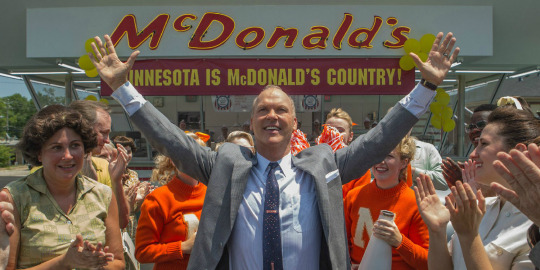
Set aside a few bucks for a milkshake and a burger after this film. Just trust me on that. The Founder tells the story of Ray Kroc and the establishment of the McDonald’s fast food empire. I did not know the history of McDonald’s, so this film was not only entertaining, but educational for me. Michael Keaton fully embraces the role of Kroc, taking on his (to borrow another line from Hamilton) “never satisfied” attitude on life. As he bullies his way to the top, we also see the tragic downfall of the endearing Richard and Maurice McDonald, played by Nick Offerman and John Carroll Lynch, whose portrayal of the brothers turns out to be the film’s strongest feature. As Matt Zoller Seitz from RogerEbert.com puts it, “[The Founder] is an ad that becomes a warning before circling around and becoming another, darker kind of advertisement, and one of the most intriguing and surprising things about The Founder is that, in the end, it seems vaguely ashamed of itself for letting this happen.”
#11: Moana

2016 was the year of the animated film, and we have hit the first one on my list. With Moana, Disney continues to showcase its amazing progress in animation; the islands and the water in Moana look so life-like. Moana brings viewers a welcome surprise in that there is absolutely no romance in this film, taking it a step further than even Frozen. Moana is all about ancestry, culture, family, and finding your calling in life. It is also extremely touching; do not be surprised if you find yourself unconsciously crying throughout the film. Lin-Manuel Miranda, the genius creator of Hamilton, and Opetaia Foa’i come together to create an incredible soundtrack full of soaring, vibrant songs like “We Know the Way” or Moana’s (Auli’i Cravalho) anthem “How Far I’ll Go.” Jermaine Clement’s “Shiny” is one of the best villain songs Disney has produced in a long time, and “You’re Welcome” perfectly embodies the character of Maui as well as his voice actor, Dwayne “The Rock” Johnson. For all that it does well, Moana can afford to have a very, very basic plot, but if it would have improved on that front, it may have found itself higher on my list.
#10: Arrival

Director Denis Villeneuve delivers another critically-acclaimed film with Arrival. Based on Ted Chiang’s short story “Story of Your Life,” this science fiction film explores the untouched aspects of the genre, choosing to investigate communication instead of destruction. In the film, the spacecraft of extraterrestrials known as heptapods appear scattered across different parts of Earth. Renowned linguist Louise Banks, played by Amy Adams, is called upon to attempt to communicate with the heptapods by learning how to read and write their language alongside physicist Ian Donnelly, played by Jeremy Renner. The cinematography by Bradford Young is truly breathtaking throughout the film. Combined with Johann Johannsson’s beautiful, otherworldly score (see “First Encounter” and “Heptapod B”) and subtle “show don’t tell” acting, this cinematography creates heart-pounding, white knuckle suspense that keeps you on the edge of your seat.
I was totally onboard with this film until the last ten or fifteen minutes. A certain plot twist is revealed that I can see as one that splits the audience in half on the matter, and the quality of the dialogue goes way downhill all of a sudden. By no means did it ruin the film for me, but it just made me love it a little less. As long as you do not go into this film expecting Independence Day-style science fiction action and are ready to put your thinking cap on, you should enjoy the experience.
#9: Patriots Day
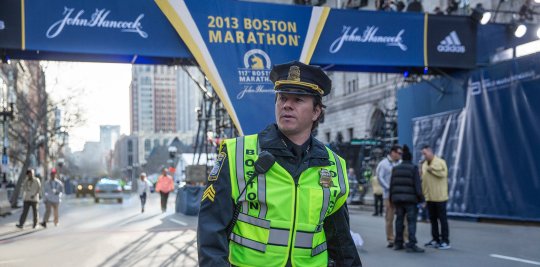
Peter Berg and Mark Wahlberg were busy in 2016! After producing Deepwater Horizon, they return to produce a film about another disaster in recent American history, the 2013 Boston Marathon bombing. Some may question if this film is too soon, but rest assured that it treats its source material with respect. While Mark Wahlberg is usually the standout actor in Peter Berg’s recent films, everyone shines in Patriots Day. J.K. Simmons, John Goodman, and Kevin Bacon are all great, and I was left wishing they had taken even a little more screen time from Wahlberg. On a dramatic level, this thriller leaves you at the edge of your seat. I could feel the suspense and anticipation throughout my sold-out theater, and I could hear the sobs and sniffling of many.
I did not feel that this film delved into exploitative thriller territory, but I cannot speak for the people of Boston and those who experienced the tragedy firsthand. The Boston Globe’s Ty Burr, however, can. He says in his review, “It’s professionally made, slickly heartfelt, and is offered up as an act of civic healing. At best, it’s unnecessary. At worst, it’s vaguely insulting.” Again, having only experienced the bombing thousands of miles away from television news media reports, I have to disagree with Burr’s assertion that this film is unnecessary. It is genuinely moving on an emotional level, and it reinforces the ideas that good always wins and that Americans will stand united in the face of terrorism.
#8: Captain America: Civil War
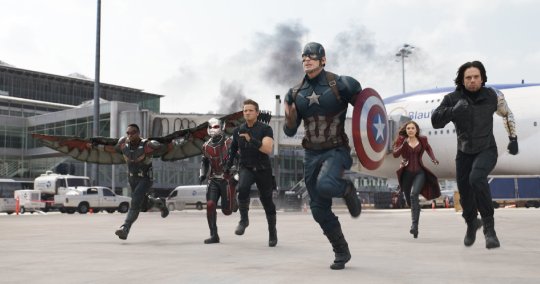
Captain America: Civil War is essentially Avengers 2.5. Following the success of Captain America: The Winter Soldier, the Russo brothers return to direct Civil War. Everything since the first Iron Man has been building up to this film. Although it does indeed have its flaws, the good far outweighs the bad here. While it is labeled as a Captain America film, the Russo brothers smartly give Robert Downey, Jr. plenty to work with in his role as Tony Stark/Iron Man. This may be, in fact, the best Downey, Jr. has been in the Marvel franchise since the first Iron Man. Surprisingly filled with emotional depth, the character development in Civil War is outstanding considering the cornucopia of characters in the film. Not only does the film continue to develop its veteran playmakers, but it also does a great job introducing brand new characters to the universe. Another positive of this film is that it imposes real, lasting consequences on the actions of our heroes. Bygones are not bygones by the end of this film. In the end, Civil War delivers on its promise of pitting Avenger against Avenger. Although punches are obviously being pulled in the airport battle, it is still an entertaining sequence that showcases each individual character. Now can we please stop focusing on Bucky moving forward with Captain America?
#7: Kubo and the Two Strings

Darn you, McConaissance! If it were not for Matthew McConaughey, this film may have ended up higher on my list. McConaughey is by no means bad in his role, but he just seems out of place in this film. Aside from that, it is hard to find any serious faults with this film without getting overly nitpicky. Kubo and the Two Strings is an aesthetically beautiful work of art with its 3D stop-motion. The voice acting is some of the best of the year: Art Parkinson as the adventurous and imaginative Kubo, Charlize Theron as the sickly but loving mother of Kubo and the grumpy but protective Monkey, Rooney Mara as the creepy Sisters, and Ralph Fiennes as Raiden the sinister Moon King all fully embrace their roles and add layers upon layers to the characters with the simplest of voice inflections. The score is also top notch, transporting you directly into the story. Kubo and the Two Strings is an adventure filled with humor, darkness, love, melancholy, and inspiration that completely absorbs its viewers.
#6: Zootopia

It was practically a toss-up between Kubo and the Two Strings and Zootopia, but Zootopia won out in the end because of its thoughtful, timely themes of discrimination and social stereotypes and how well the film handles them. The voice acting is on point, with such talent as Ginnifer Goodwin, Jason Bateman, J.K. Simmons, Idris Elba, and Alan Tudyk. The animation is gorgeous, and the sprawling urban Zootopia is fleshed out and full of character. Whereas Moana has a very simple plot, Zootopia offers a couple of unexpected twists. The stereotypes that the animals fit into work perfectly, and the film really makes you care about its main characters. Full of humor and Easter eggs, this film celebrating diversity will make you want to go back for repeat viewings, all the while perpetually humming Shakira’s “Try Everything.”
#5: Sing Street
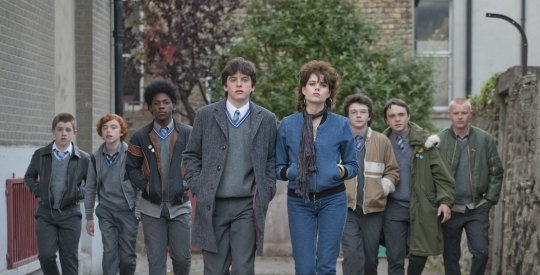
Sing Street was a huge surprise for me. It was nowhere on my radar of films to see. I just happened to come across it while scrolling through Netflix, and boy am I glad I decided to watch it! At its core, Sing Street is about a teenage boy who starts a band to impress a girl and get her to like him. “Eh, seen it before,” you say? Maybe, but not as well done as this. Set in Dublin in the 1980s, this film is a feel-good musical comedy-drama where every single song is outstanding with a charismatic Irish cast and huge heart that is not only about getting the girl, but also friendship, brotherhood, and pursuing dreams. Sing Street knows what it wants to be and embraces it without turning into a musical fantasy, leaving viewers full of irresistible optimism and humming its catchy tunes while looking up Duran Duran songs at the end of the film.
#4: Hell or High Water
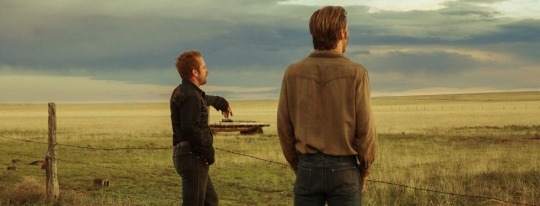
I could not say it any more eloquently than Mason Walker did, so I will just start by leaving what he said about this film, all thanks to the exemplary cinematography of Giles Nuttgens: “Plenty of films pretend to take place in small-town Texas, but many of those versions resemble my home state about as much as the ‘barbecue’ joint I visited in New York resembled barbecue. But this wild Neo-Western gets it right. Here is a rural Texas I recognize, where the Aggie Game’s always on, the Shiner is within arm’s reach, and the customers and wait staff play out their familiar interactions like a social-norms square-dance.” In reality, the filming took place in New Mexico, but that is close enough so we will give it a pass, right?
Hell or High Water follows two brothers, played by Chris Pine and Ben Foster, who carry out a series of bank robberies to save their family ranch, all the while being hunted by two Texas Rangers, played by Jeff Bridges and Gil Birmingham. Foregoing mindless gunfights, Hell or High Water stuns with its complex characters and well-paced narrative. Director David Mackenzie deftly mixes scenes dripping with suspense with scenes full of lighthearted Texan humor. Taylor Sheridan’s screenplay includes some brilliantly written dialogue that especially comes through during the final scene of the film on the porch. The stupendous acting, particularly by Jeff Bridges as the Texas Ranger on the brink of retirement, brings it all together in this heartfelt heist film.
#3: Hacksaw Ridge
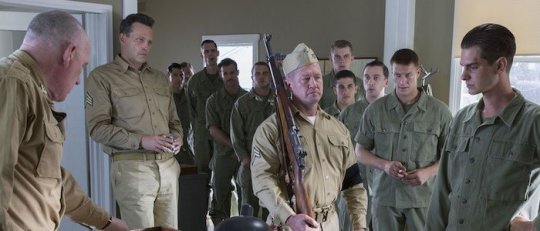
This was another toss-up between Hell or High Water and Hacksaw Ridge, but Andrew Garfield’s Oscar-worthy acting helped Hacksaw Ridge edge it out. Hacksaw Ridge is based on the true story of Garfield’s Desmond Doss, the first conscientious objector to be awarded the Medal of Honor. With Hacksaw Ridge, Mel Gibson makes a triumphant return to the director’s chair for the first time since 2006 when he released Apocalypto. Gibson boldly and fearlessly tackles this film on the level of both a large scale war drama as well as a concentrated character study. Like few other directors can do, Gibson seamlessly transitions from some of the most graphically violent scenes you will ever see on screen to endearingly tender, touching emotional scenes.
Before we get to Garfield, Vince Vaughn deserves his own round of applause. When people think of Vaughn, they probably think of films like Wedding Crashers or Dodgeball: A True Underdog Story. In Hacksaw Ridge, Vaughn proves he can handle a serious dramatic role when he is dialed in. Hugo Weaving also delivers a great performance as Doss’ father, a troubled World War I veteran. In the end, though, this is far and away Garfield’s film. From playing a comic book hero to a real life hero, Garfield’s career sure has blossomed. With Doss’ story, Garfield has such wealth of inspiration to draw from. From his simple life growing up in Virginia to the cacophony of war while serving as a combat medic at Hacksaw Ridge, Garfield plays every scene perfectly. At the beginning of the film, you might wonder if Garfield’s southern accent is going to detract from the film, but he is so committed to it that it ends up working.
Doss’ steadfast Seventh-day Adventist faith is certainly present in the film, but it never gets preachy or hits you over the head with it. It is actually very important that it was included because it was such a central part of who Doss was. Gibson does go a tad overboard with the religious imagery, especially with the themes of baptism and ascension, but that is a central part of Gibson’s trademarked directorial style. Hacksaw Ridge is an inspiring war film whose main character never even picks up a rifle, much less fires one, offering a different way to envision courage.
#2: The Edge of Seventeen

Never have I ever seen a more accurate portrayal of life as a high schooler. I will flat out say it: this film blew me away. I remember walking out of the theater so happy and extremely proud of everyone involved with the film. For her directorial debut, Kelly Fremon Craig hits it out of the park. Do not pass this film up as just another coming-of-age dramedy because it is so much more than that. This film will have you laughing, this film will have you crying, this film will have you cringing at the all-too-relatable awkwardness, and sometimes this film will have you doing all three at the same time. In short, it touches on every single emotion, but never in a sappy or undeserved way. Craig not only directed the film, but she also produced and wrote it. The sharp dialogue sounds exactly like something that would come from the mouth of a high schooler in 2016.
The acting is terrific all around. Hayden Szeto masterfully emulates myself in high school as Erwin Kim. Woody Harrelson nails it in his role as a high school teacher and confidant. Kyra Sedgwick expertly assumes the challenges of being a mother to teenage children. Blake Jenner surprises with his subtle acting as Darian. Last but certainly not least, Hailee Steinfeld proves she is the real deal as 17-year-old Nadine, the film’s main character. Perhaps even more impressive than her line delivery is Steinfeld’s ability to act with her body language doing most of the heavy lifting. The Edge of Seventeen forgoes the teen tropes from John Hughes movies in favor of fully developed, three-dimensional characters who emotionally grow right before our very eyes. It has its hilarious moments, but it is not afraid to heavily tap into reality and maturely handle the really serious situations that teens may face today. Male or female, young people and parents alike will be able to relate to this film on a deeply personal level.
#1: La La Land

I never considered musicals to be one of my favorite genres, which makes it all the more noteworthy that La La Land lands at the top of my list for 2016. I was beyond impressed with director Damien Chazelle’s work with 2014’s Whiplash, a film about the destructive cost of single-mindedly pursuing one’s dream. La La Land adopts a much more positive spin on this message as it follows Mia, an aspiring actress played by Emma Stone trying to make it in Hollywood, and Sebastian, a jazz pianist played by Ryan Gosling with the dream of reviving jazz and opening up his own jazz club. The impressively stunning opening scene of the film, which I won’t spoil here, had me smiling from ear to ear, and I could feel the entire theater straining from holding back their rapturous applause.
From that opening scene on, Linus Sandgren’s cinematography prowess is on full display, allowing the camera to become just as much a part of the choreography as the actors on screen. Ryan Gosling and Emma Stone’s chemistry is unrivaled by anything else you will see on screen from 2016, making the relationship between their characters feel real and honest, and their dedication to their roles is palatable. The set design and costumes, two aspects of films that do not get paid nearly enough attention, are remarkable in La La Land. The vibrant colors and the smog-less skyline of Los Angeles create fantastical imagery that fit in with the grand dreams of the film’s two main characters. Chazelle’s writing is composed of snappy dialogue that is full of heart and honesty.
I sometimes find that the song and dance part of musicals distract from the plot of the film, but, credit to Chazelle’s writing and Justin Hurwitz’s music, La La Land’s musical numbers work as a cohesive unit with the plot and even elevate it. Hurwitz’s music is impressive instrumentally and dazzling with its creative, insightful, and thought-provoking lyrics. Hurwitz’s ability to shift gears throughout the film is praiseworthy. One moment, he is powering through the upbeat “Another Day of Sun.” The next he is revving it up again for the equally catchy “Someone in the Crowd,” but even within that song he slows things down to a point where the audience can soak it all in before picking the pace right back up. “Mia & Sebastian’s Theme” and “Planetarium” take the audience on a whimsical adventure. “Herman’s Habit” is jazz at its finest. In “A Lovely Night,” Hurwitz channels classic Hollywood duet material. With “Audition (The Fools Who Dream),” Hurwitz and Stone make you wish you had a box of Kleenex handy. As the film approaches its bittersweet ending, Hurwitz flawlessly sums the entire film up musically in “Epilogue.” La La Land is a technical masterpiece, and its record seven Golden Globe wins prove it. Thank goodness Whiplash succeeded so that Chazelle could bring us this powerfully intimate masterwork.
I think it is important that I list all of the films I can remember seeing with a 2016 release date (37 in total) so that you have an idea of what the competition was like.
· Jane Got a Gun
· Deadpool
· Zootopia
· Midnight Special
· Batman v. Superman: Dawn of Justice
· Captain America: Civil War
· The Jungle Book
· X-Men: Apocalypse
· The Lobster
· Alice Through the Looking Glass
· Neighbors 2: Sorority Rising
· Finding Dory
· Star Trek Beyond
· Suicide Squad
· Kubo and the Two Strings
· Hell or High Water
· Sully
· The Magnificent Seven
· Deepwater Horizon
· Miss Peregrine’s Home for Peculiar Children
· The Accountant
· Doctor Strange
· Hacksaw Ridge
· Arrival
· Fantastic Beasts and Where to Find Them
· Sing Street
· The Edge of Seventeen
· Manchester by the Sea
· Moana
· Jackie
· La La Land
· Rogue One: A Star Wars Story
· Hidden Figures
· The Founder
· Patriots Day
· �� A Monster Calls
· Silence
1 note
·
View note
Text
Top 10 biggest misconceptions about Atheism: via /r/atheism
Submitted August 06, 2020 at 05:55PM by DerangedBehemoth
(Via reddit https://ift.tt/2DHr58A)
Top 10 biggest misconceptions about Atheism:
DISCLAIMER: This is not completely original. This is more or less a paraphrase and build up on a list created by TJ Kirk (AKA Amazing Atheist) years ago. I simply posted it because I enjoy discussing these things thoroughly and added on a few other perspectives.
10. Atheists worship the devil
Most people with half a brain are fully aware of how silly this is, but I hear it frequently enough that I felt it worthy of mentioning. So that being said, atheists don't believe in a god or gods, therefore they don't believe in the judeo-christian god, therefore they do not believe in his arch-nemesis, SATAN. It would be nonsensical to worship something we don't believe in.
That being said, there are atheists/anthitheists out there like myself that tend to identify with Satanism as conceived by "Anton LaVey", where Satan is more of a metaphorical symbol of humanity's primal nature, as opposed to a horned beast who resides in hell over the sinners of Earth for eternity.
9. All atheists are anti-religion
Yes, many atheists, including myself, identify as antitheist; meaning we believe that religion is not only false, but also view it as a detriment to the progression of humanity. There are varying degrees of which antitheists view religion as a detriment, from mild to extreme, but the majority of antitheists do NOT support any form of government mandated abolishment of religion. And I can say with strong confidence that such a belief would not correspond or collaborate with the ideals of any reputable atheist advocate groups or organizations, or even by any somewhat reasonable atheist individual.
That being said, the idea of atheism itself in no way entails antitheism by default. There are many atheists who advocate that religion is a social adhesive, and can/should be applied in ways that are beneficial to the progression and cooperation of civilization. While I personally do not agree FULLY with this belief, I can very much identify with some of the basic ideas of it.
8. The burden of proof is on atheists.
The burden of proof is always on the party making a claim. Saying there is no god is not a claim, it is rather the response to the claim that there IS a god. The fact of the matter is that there has been no HARD evidence of a god or gods, nor has their been any evidence whatsoever that we have the ability to lean heavily on any religious practice for practical purposes.
In other words, not only has there been no hard scientific evidence of a deity that exists within the confines of any of the detectable senses or measurements, but it has also been seen time and time again that things like prayer and rituals have no effect on the outcome of actual events.
We have as much credible evidence for an abrahamic deity as we do a flying spaghetti monster or magic rainbow robot unicorn. Therefore, any religious claims should continue to be regarded as nothing but hearsay with no official recognition as a plausible explanation (scientifically, judicially, socially, etc.)
7. Atheism is responsible for some of history's greatest atrocities.
This is known as the "atheist atrocities fallacy", and it has been thoroughly explained and picked apart multiple times by multiple reputable people and groups. However, in all honesty, it isn't terribly difficult to refute this fallacy. 1. There are FAR more atrocities that happen on a daily basis under the banner of religious extremism as well as plenty of major historical tragic events that happened under the banner of religion (The crusades, 9/11, the Salem Witch Trials, etc.) Hitler was NOT atheist. Hitler claimed to be Catholic, and referenced god many times in his speeches. The belt buckles of the SS were even engraved with "God With Us". Hitler may have used religion as a contrivance, but his regime was not anti-religion.
The only official atheist figures of atrocity we know of from history were Joseph Stalin and Pol Pot. However, the motivation behind these anti-religious campaigns were simply to solidify the power of the state, and further perpetuate these men's own cult of personality and totalitarian rule. Their evil actions clearly were done in the name of their own greed for power and prestige, their motivation and driving force was certainly not "atheism" itself.
6. Atheists have lost their faith or connection to God
This is a common idea thrown out in response to discovering that an individual is an atheist; The idea suggests that one is an atheist simply due to something along the lines of having lost their way due to a traumatic experience, overwhelmed by worldly negativity, or cynical mental state. It perpetuates this regard for atheists as what one may call the "lost lamb" or "prodigal son" perspective. This is quite often referenced in Christianity, but many other popular religions carry a similar perspective with the same basic principle that atheists are just individuals gone astray from god's flock.
In reality, this is actually an odd sentiment that happens to be popularly carried by religion which suggests that belief in god is a default, while atheism is peculiar aberration. It's not difficult to discern how this idea comes to be, the real question is why? It's not because they instinctually carried a belief in god from the moment of birth, but rather because they were TAUGHT what to believe, which instilled the idea of god in their heads. That's why a boy born in Iraq will KNOW that Islam is the unquestionable answer to life's major questions, while a girl born in Louisiana will know that Southern Baptist is the unvarnished truth.
5. Atheists have no sense of spirituality.
This assumption runs on the idea that spirituality and religion are one in the same. There are many similarities, but the idea that they are essentially the same thing is false. There are many atheists that would claim to carry heavy interest in spirituality, and thoroughly enjoy open-mindedly exploring spirituality through various practices. Spirituality can probably best be defined as;
"a sense of wonder at the beauty of the universe, the complexity of life, the magnitude of space, the magnitude of geological time, all those things create a sort of frission in the breast which you could call spirituality." -Richard Dawkins.
I myself wouldn't consider myself to be a "spiritual" person in the popular sense of the word, but I'm highly sympathetic to the idea and have certainly been open to spiritual ideas and practices.
4. Atheists have no way of dealing with death.
Atheists grieve for the loss of loved ones and tragic events just as much as anybody else does. Truth be told, there is likely a slightly heavier sense of anguish for individuals that do not carry a belief of an afterlife, as there is no blanket of security that allows these individuals to alleviate the feeling of loss with the idea of an inevitable eternal paradise for all. However, atheists have ways of coping with their grief and coming to terms with reality through various means. What those methods are are completely up to the individual. Death is a tragic event and it should be a painful experience. To allow one's self to feel that sadness with all of it's weight and implications is a good way to honor the life of the person or people for whom you mourn. I still love and cherish the time and memories I have with people I love and have loved in this world completely regardless of what lies beyond. But the fact of the matter is that our existence on this planet to our knowledge is temporary, and it is up to us to not only take advantage of what little time we have, but to accept that once this life is done, we move on. What we move onto is a question that humanity will likely NEVER have an undeniable answer to and will only know as individuals once it's too late.
This may be a far less comfortable view of mortality than what religion has to offer, but people have proven time and again that religion is very much not necessary to confront this reality and prepare for it.
3. Atheists lead meaningless lives.
I would argue that this belief is one of the most presumptuous misconceptions of all the others. 1st of all, this assumption presumes that a meaningful life is measured by devoting all of one's time and effort into appeasing an all powerful deity trying to impose their will onto you. 2nd of all, we are highly cognitive developed primates, who through biological and social evolution have discerned a vast amount of ideas and information about the universe and our place in it. We also have the ability to reflect on the truths that we have discovered, and we can amend and enhance them as new facts come to light. I believe that in the pursuit of knowledge and understanding, there is GREAT meaning.
2. Atheists have no moral compass
There is no sentient mature human being in the history of time that did not adhere to some sort of moral code or compass. Even the most wicked people throughout history had their own set of principles and ideals. We as human beings are responsible for setting our own standards and codes as we see fit. What many religious people don't realize is that they their own moral code doesn't likely come from the bible. Those who assisted in setting their moral code from adolescence likely referred to the bible as a SOURCE, but in actuality this is simply a contrivance for creating a foundation for civil behavior.
To simplest scientific reasoning behind moral codes are the following; Empathy, civil order, social contract.
We don't simply walk around attacking random individuals as we please because we do not wish the same thing upon ourselves. To some degree or another, whether it be a lot, or extremely little, we see other human beings as our kinfolk of whom we do not wish harm upon.
We enjoy living in a peaceful organized civilization to some degree or another, and we understand there are certain codes that we all must follow as a community in order to maintain that. Obviously, what exactly these codes should entail specifically will vary in opinion between individuals, but the basic fundamental end result that the majority of humans carry is that we want to live in a thriving successful civilization.
Lastly, we all carry a hypothetical social contract of peaceful behavior. Once again, this is why we mind our business and do not randomly disturb or conflict with random strangers. If someone does do this, they are essentially violating that contract which will cause a mutual conflict, which can carry anywhere from mildly inconvenient to catastrophically detrimental results.
All of this is a very simple bare explanation of basic moral code. The reality is that moral codes develop through a vast complex network of knowledge, wisdom, experiences, desires, goals, etc.. The main foundation and origin of all morality is most definitely NOT religion.
1. Atheists all think the same way
The very idea of atheism as I said at the beginning is extremely broad and vague. If you look at a group of atheists, you will discover that their backgrounds, specific beliefs, interests, ideas, and approach to religion all vary and differentiate EXTREMELY heavily from person to person. Granted, the same could be said for some religions, but religion itself carries a set of required beliefs (some more than others), while atheism only requires one very simple opinion; There is no god. In fact, even that alone can be interpreted differently as far as what it entails.
0 notes
Text
A “view” from the courtroom: “Strong feelings” in the latest abortion case
The court has just one case today to close out the argument portion of the February sitting, but it’s a big one.
In June Medical Services LLC v. Russo, the justices will consider whether Louisiana’s law requiring abortion doctors to have admitting privileges at nearby hospitals conflicts with the court’s decision just four years ago in Whole Woman’s Health v. Hellerstedt striking down a similar law in Texas. There is also the cross-petition from Louisiana about whether abortion providers have third-party standing to challenge health and safety regulations on behalf of their patients.
Today, virtually every seat in the courtroom will be filled, which doesn’t always happen even in some blockbuster cases.
Bird’s eye view of the courtroom during argument in June Medical Services v. Russo (Art Lien)
In the public gallery, Kathaleen Pittman, the director of the Hope Medical Group for Women clinic in Shreveport, which is owned by June Medical, is here. Nancy Northrup, the president and CEO of the Center for Reproductive Rights, which represents the clinic, is here, as is Amy Metzler Ritter, the chair of CRR.
Amy Hagstrom-Miller, the CEO of Whole Woman’s Health, the consortium of health care and abortion clinics at the center of the Texas case, is also here.
I was told by CRR that none of the several doctors identified in court papers as “Doe” would be in attendance today. Their particular circumstances with respect to the admitting-privileges requirement will be the subject of numerous questions.
At the south end of the front row of the public section sit two U.S. senators who have evidently taken up Chief Justice John Roberts’ invitation to attend a session of the court. One is Sen. Bill Cassidy, a Republican from Louisiana who is trained as a physician. He is among the 207 members of Congress who signed an amicus brief in support of Louisiana organized by Americans United for Life, a prominent anti-abortion group.
The other is Sen. Richard Blumenthal, Democrat of Connecticut, who is among 197 different members of Congress who signed a brief in support of the challengers. The difference in the number of signers of the competing briefs probably does not carry any great weight with the justices.
In the bar section, there is a contingent from the American Civil Liberties Union, including Louise Melling, the deputy director and director of its Center for Liberty, which oversees abortion rights and other issues. Also in the courtroom today is Ilyse Hogue, the president of the National Abortion Rights Action League.
At the counsel table on the left, Julie Rikelman of CRR, who will argue for June Medical Services, arrives with her co-counsel, including Travis Tu of CRR and Jeffrey Fisher of Stanford Law School and O’Melveny & Myers.
Meanwhile, the Louisiana entourage arrives to defend the state’s law, including Louisiana Attorney General Jeff Landry and Solicitor General Elizabeth Murrill, who will argue the case. They are joined in the bar section by U.S. Rep. Mike Johnson, a Republican from Louisiana’s 4th district, who will video tweet afterwards to say that he helped defend the law in the federal district court before being elected to Congress in 2016 from the district that includes Shreveport.
Abortion clinics in the Shreveport, Baton Rouge and New Orleans areas are the focus of this litigation, but because Hope Medical Clinic is in Shreveport, there is a bit more attention on that medium-sized city.
This might be a good place to mention that your reporter once lived in Shreveport, which is in northwest Louisiana and might be said to have more in common with button-down Dallas and conservative East Texas than it does with the “laissez les bon temps rouler” vibe of New Orleans and southern Louisiana. This Chicago native was a bit of a fish out of water in that sleepy burg. I’ll put it this way. Seemingly right after I left after two years at a newspaper job there, the region gained two, um, cultural innovations that would have made it a more interesting place to live: a minor league hockey franchise and riverboat gambling. Also, somewhat improbably, the area became one of those non-Hollywood film production locations, so you might occasionally read that one star or another was arrested in a local bar fight “while he was filming a movie in Shreveport.”
Among the representatives of groups supporting the Louisiana law here today are Steven Aden and Clark Forsythe of Americans United for Life and Jordan Lorence and John Bursch of the Alliance Defending Freedom.
Just 10 minutes before the start of court, Ashley Kavanaugh, the wife of Justice Brett Kavanaugh, arrives and takes her seat in the VIP section. She is soon followed by Joanna Breyer, the wife of Justice Stephen Breyer, and Jane Roberts, the wife of the chief justice.
Top court officers also fill most of the seats reserved for them. But retired Justice Anthony Kennedy, who provided the crucial fifth vote for striking down the Texas regulations in Whole Woman’s Health, is not in the courtroom today.
As the argument proceeds, demonstrators on both sides of the abortion issue are holding their competing rallies on the sidewalk outside the court. No one inside the courtroom is aware of the contretemps that Sen. Charles Schumer of New York, the Democratic leader, is evidently causing with his remarks to the abortion rights demonstrators, which will later elicit a public response from the chief justice.
Amy Howe has this blog’s main account of the hourlong argument.
Just minutes into Rikelman’s presentation on behalf of June Medical Services, a cellphone chime goes off, followed by a bell. The culprit is not evident, though it does not appear to be a member of the court. Whenever I appear before a student group or others to discuss the court, I mention the time in 2017 when Breyer inadvertently brought his phone into the courtroom and, of course, it rang. The students whose phones have long been regulated in school really identify with the justice.
When the mystery phone isn’t pinging and chiming, as it does a couple more times throughout the hour, there are two distinct vibes to the argument. One revolves around the fact that the newest members of the court are facing their first argument in an abortion case. Justice Neil Gorsuch does not ask a single question. Kavanaugh, meanwhile, has quite a few.
“Are you saying that admitting privileges laws are always unconstitutional, such that we don’t have to look at the facts state by state?” he asks Rikelman. “Or are you saying that actually you do look at the facts state by state, and in some states, admitting privileges laws could be constitutional, if they impose no burdens?”
She holds her ground in several variations of the question, maintaining that such laws serve no valid state interest.
Kavanaugh asks five questions of Rikelman, one of Principal Deputy Solicitor General Jeffrey Wall, who is arguing on behalf of the U.S. government in support of Louisiana, and none of Murrill.
For the other members of the court, the vibe is that positions are well staked out on this divisive issue.
Justice Samuel Alito, a member of the minority in Whole Woman’s Health, sharply questions Rikelman on the third-party standing of the abortion providers, finding several of her answers “amazing” or “highly debatable.”
Roberts asks a question (Art Lien)
As for the other dissenters in Whole Woman’s Health, Justice Clarence Thomas is silent as usual while Roberts asks questions that will be highly scrutinized but don’t seem to reveal his views.
“Counsel, do you agree that the inquiry under Hellerstedt is a factual one that has to proceed state-by-state?” he asks of Rikelman. He poses a variation of that question to both Murrill and Wall.
“[W]hy do you look at each state differently if the benefits of the law—they’re not going to change from state-to-state?” the chief asks Wall.
The remaining members of the majority in Whole Woman’s Health—Justices Ruth Bader Ginsburg, Stephen Breyer, Sonia Sotomayor and Elena Kagan—each have vigorous questions that show their skepticism of the Louisiana law’s constitutionality.
Ginsburg ponders the issue at hand (Art Lien)
Ginsburg gets a laugh when she asks Rikelman a friendly question about Craig v. Boren, a 1976 case involving disparate legal drinking ages for young men and women, in which she filed an amicus brief when she was with the ACLU. The decision helps bolster the abortion providers’ third-party standing claim.
“You made a point about Craig versus Boren, that the ostensible purpose of the law was to save the vulnerable young men from the evils of 3.2 beer?” Ginsburg says.
“That’s correct, your honor, and the court allowed the saloon keeper to bring the third-party standing claim,” Rikelman says.
Ginsburg seeks repeatedly to knock the state’s rationales for its admitting-privileges requirements.
“Is it not the fact that most hospitals in Louisiana, in order to get admitting privileges, you have to admit a certain number of patients?” she asks Murrill. “Abortion providers will never, … if they’re not also doing obstetrics and gynecology, they will never qualify because their patients don’t go to the hospital.”
Breyer, who wrote the majority opinion in Whole Woman’s Health, has an exchange with Wall late in the argument that seems to summarize the ideological gridlock over abortion rights.
“How do you deal with this?” Breyer asks Wall. “I have read the briefs. I understand there are good arguments on both sides. Indeed, in the country people have very strong feelings and a lot of people morally think it’s wrong and a lot of people morally think the opposite is wrong.”
“And in [Planned Parenthood of Southeastern Pennsylvania v.] Casey, and the later cases,” he adds, “I think personally the court is struggling with the problem of what kind of rule of law do you have in a country that contains both sorts of people.”
When the argument is over, the clinic director, the advocates and the politicians make their way quickly to the court’s plaza to address the media, and then to the wide sidewalk, where “both sides” of this intractable issue hold their loud, competing rallies.
The post A “view” from the courtroom: “Strong feelings” in the latest abortion case appeared first on SCOTUSblog.
from Law https://www.scotusblog.com/2020/03/a-view-from-the-courtroom-strong-feelings-in-the-latest-abortion-case/
via http://www.rssmix.com/
0 notes
Text
Why Is There So Much Saudi Money in American Universities?
Saudi Arabia directed about $650 million to American universities from 2012 to 2018 and ranks third on the list of foreign sources of money. M.I.T. received $7.2 million in the last fiscal year. An M.I.T. report noted that M.I.T. is been aware of Saudi Arabia’s “internal repression and external aggression” but that until recently some still believed it was on a path to becoming a more progressive society. “The Khashoggi murder has deflated many of those hopes. There were also the particular facts of this case, notably the combination of brazenness, brutality and contempt for international opinion that made it stand out even within the crowded global gallery of official malevolence.” If you were an M.I.T. administrator, what would you do: (1) continue to accept money from Saudi Arabia, or (2) reject all future money? Why? What are the ethics underlying your decision?
One spring afternoon last year, protesters gathered on a sidewalk alongside a busy street in Cambridge, Mass. City buses rolled past. Car horns sounded. A few pedestrians paused briefly before continuing on their way. The location was 77 Massachusetts Avenue, in front of a limestone-and-concrete edifice that serves as the gateway into the Massachusetts Institute of Technology. The building’s lobby leads to a long hallway known as the Infinite Corridor and into the heart of one of America’s most vaunted academic institutions.
Mohammed bin Salman, the crown prince of Saudi Arabia, would be visiting the next day. The protesters, a mix of students and local peace activists, wanted his invitation revoked. They were opposed to the prince being welcomed as an honored dignitary and were calling attention to the Saudi state’s financial ties to M.I.T. — and to at least 62 other American universities — at a time when the regime’s bombing of civilians in a war in neighboring Yemen and its crackdown on domestic dissidents were being condemned by human rights activists.
Prince Mohammed, who is 33, became Saudi Arabia’s de facto leader in 2017, when he was named crown prince by his ailing father, King Salman. He was in the midst of an American tour and had already been to the White House to meet President Trump, who said, as they sat together in the Oval Office, that they had become “very good friends over a fairly short period of time.” The president thanked the prince for what he said was the kingdom’s order of billions of dollars of American-made military hardware. “That’s peanuts to you,” he quipped.
From Cambridge, Prince Mohammed’s travels would take him to California, where he rented the entire 285-room Four Seasons hotel in Beverly Hills and was the guest of honor at a dinner hosted by Rupert Murdoch and attended by numerous entertainment-industry grandees. In Silicon Valley, he met with Tim Cook, the chief executive of Apple, and other tech executives; in Seattle, he met with Jeff Bezos, the Amazon chief executive. Saudi Arabia was already an investor in Uber through its sovereign wealth fund, which is controlled by the crown prince, and Prince Mohammed was negotiating to buy a stake in Endeavor, the Hollywood conglomerate that includes the WME talent agency and the Ultimate Fighting Championship business.
At these stops on the West Coast, he dressed in either a suit or jeans, sport jacket and open-collared shirt, instead of the traditional black robe and red-and-white-checkered kaffiyeh he wore to the White House. “Here was this young guy who was sort of hip and fit in with the Silicon Valley and Hollywood crowd, and they were easily manipulated,” says Robert Jordan, an ambassador to Saudi Arabia under President George W. Bush. “It was money speaking, and the temptation to hook up with a massively funded kingdom.”
On the sidewalk that day in Cambridge, one of the featured speakers was Shireen al-Adeimi, who is 35. She was born in Yemen and spent part of her childhood there. Her relatives in Yemen were now living through a civil war, one that had caused tens of thousands of civilian casualties and was threatening millions with famine — and yet had barely registered in the American news cycle at that point. The American universities doing business with the Saudis — largely in the form of sponsored research, paid for with money from Saudi Aramco, the giant oil company, and other state-owned industries — saw no reason to stop, and the lonely voices who argued against those ties were easily ignored.
Al-Adeimi lived nearby with her husband, a Ph.D. student, in an apartment owned by M.I.T. She was finishing her own doctoral studies at Harvard and would soon begin a job as an assistant professor of education at Michigan State. She had never been politically active before — “If I ever had something to say in public, I thought it would be about education,” she says — but had started speaking out against Saudi conduct in Yemen by posting on social media and by writing to American politicians. At the demonstration, she wore a gray blazer and a peach head scarf and spoke in a soft but steady voice into a hand-held microphone. “The man M.I.T. is hosting is starving millions of people to death by blockading access to food and medicine,” she said. “The man M.I.T. is hosting has created the worst humanitarian crisis on earth. Simply put, the man M.I.T. is hosting is a war criminal, and he should be punished for his crimes and not welcomed here.”
Al-Adeimi and five others entered the M.I.T. building and walked down the Infinite Corridor to deliver a petition to the university’s president, Rafael Reif. There were some 4,000 names on the petition asking him to cancel Prince Mohammed’s visit. Reif was not in his office, and they never got a response.
The next morning, Prince Mohammed spent several hours at M.I.T.’s Media Lab, a high-profile domain with a carefully cultivated progressive image and a language all its own. (It describes its curriculum not as interdisciplinary or multidisciplinary but as antidisciplinary.) A majority of the Media Lab’s $75 million annual budget comes from corporate patrons, which are referred to as members and pay a minimum of $250,000 each year. Prince Mohammed’s personal foundation was among the roughly 90 members. The Saudis signed three contracts that day, for a total of $23 million, two of them to extend existing research projects with M.I.T. The other one was for a new initiative between the university and Sabic, a Saudi state-owned petrochemical company, for research into more efficient refining of natural gas.
At the time of Prince Mohammed’s visit, Saudi Arabia seemed to be liberalizing, at least a little. Women had been granted permission to drive, finally, a reform that gained a great deal of media attention. When a movie theater opened in Riyadh that spring, it ended a 35-year ban on cinemas. (“Black Panther” was the first showing; a late scene, a kiss between two of the stars, was cut by censors.) Six months after the prince’s triumphal American trip, on Oct. 2, the journalist Jamal Khashoggi, a Saudi citizen who lived in Virginia and was a columnist for The Washington Post, was murdered inside the Saudi consulate in Istanbul. American intelligence agencies held the Saudi state responsible and concluded that the crown prince himself most likely authorized the action. (A United Nations report released in June reached a similar conclusion.)
Later in October, M.I.T. announced that it was reassessing its extensive links to the kingdom. Richard Lester, an associate provost who oversees the school’s partnerships with foreign entities, was put in charge of that review. A nuclear engineer by training, Lester is an M.I.T. lifer, having joined the faculty in 1979 when he was in his mid-20s; he is now 65. His mission was to explore whether a source of money could be so unsavory as to warrant rejecting or returning the funds — hardly an easy task. Once an institution goes down that road, what other donors might some on campus find objectionable? What other streams of funding could be endangered? What names might have to come off buildings?
In December, Lester outlined his preliminary findings in a letter to Reif, which was also shared with faculty members and students. Lester had to acknowledge an uncomfortable fact: “One of those individuals now known to have played a leading role in Mr. Khashoggi’s murder in Istanbul had been part of Crown Prince Mohammed bin Salman’s entourage during the latter’s visit to the M.I.T. campus,” he wrote, referring to Maher Abdulaziz Mutreb, a Saudi intelligence officer. “This individual had engaged with members of the M.I.T. community at that time — an unwelcome and unsettling intrusion into our space, even though evident only in retrospect.”
Endeavor returned a $400 million investment from Saudi Arabia this year, but many other American corporations stayed in business with the kingdom. In April, the regime executed 37 people in one day, most by beheading; one of the condemned was said to have been “crucified,” with his headless body displayed in public. Investors eagerly bought Aramco bonds, which were offered for the first time in April, and AMC still plans to build dozens of new theaters in the kingdom.
Activists on campus, however, wanted more from their universities. “They all have those Latin sayings, stating some higher purpose,” says Grif Peterson, a former fellow at the Berkman Klein Center for Internet & Society at Harvard. “Look at it, it’s right there on the wall.”
M.I.T. does not need Saudi Arabia’s money. Chartered on the eve of the Civil War (two days before the first shots were fired), it is one of those ultrawealthy universities whose finances are sometimes compared to the economies of small or midsize nations. M.I.T. spent about $3.6 billion on its operations last year, and its endowment, $16.5 billion, is the sixth-largest among American universities (and greater than the gross domestic product of nearly 70 countries, including Mongolia, Nicaragua and the Republic of Congo). The money it receives from Saudi sources is relatively modest, less than $10 million in many years, though the school has received individual gifts from Saudi billionaires of as much as $43 million.
VERY LONG ARTICLE CONTINUES ...
0 notes
Text
Bible Argument 5
By DeYtH Banger
"When it comes to defending his faith, all Randal can do is revert to special pleading, arguing from ignorance, and repeatedly punting to mere possibilities even though probabilities are all that.
We either start with the brute fact that something has always existed or the brute fact that something popped into existence out of nothing. So the simpler our brute fact is then the more probable it is, per Ockham’s razor. All that scientists have to assume is an equilibrium of positive and negative energy and the laws of physics. This is as close to nothing as science can get. But grant it and physicist Victor Stenger argues, “The probability for there being something rather than nothing can actually be calculated; it is over 60 percent.” As such, “only by the constant action of an agent outside the universe, such as God, could a state of nothingness be maintained. The fact that we have something is just what we would expect if there is no God."
- John W. Loftus
"My claim is that the raw, uninterpreted historical data is simply not enough to believe God raised Jesus from the dead because there can be no relevant background knowledge or “priors” prior to concluding he did. The main reason Christians think the historical evidence for the resurrection is conclusive is because they have already come to believe in a God who did this particular miracle, and that’s pretty much it. Overwhelming numbers of Jews in the days of Jesus did not believe it, along with millions of other people even after being confronted with this so-called evidence."
- John W. Loftus
"We do not think there is sufficient evidence to believe in supernatural forces or beings. Since this is the case, religionists must determine among themselves who is their best contender to face off against us. That process did not happen here precisely because they cannot agree among themselves who should be in the finals."
- John W. Loftus
"All that believers must do is apply the same level of skepticism to their own religion as they do to the religions of others that they reject. This is what I call the outsider test for faith. When believers understand why they dismiss all other religions, they will understand why I dismiss theirs. If they refuse to do this, I merely ask them why the double standard? Why treat other religions differently than you do your own? Believers should be skeptical of what they were taught to accept given the proliferation of so many other religions.
and sects separated into distinct regions on the planet who learned their religion in the same way—on their mama’s knee.
Be well"
- John W. Loftus
"Isn’t it enough to see that a garden is beautiful
without having to believe that there are
fairies at the bottom of it too?"
- Richard Dawkins
"If you think that, you might enjoy Chapter 3 on ‘Arguments for God’s existence’ – the arguments turn out to be spectacularly weak. Maybe you think it is obvious that God must exist, for how else could the world have come into being? How else could there be life, in all its rich diversity, with every species looking uncannily as though it had been ‘designed’? If your thoughts run along those lines, I hope you will gain enlightenment from Chapter 4 on ‘Why there almost certainly is no God’. Far from pointing to a designer, the illusion of design in the living world is explained with far greater economy and with devastating elegance by Darwinian natural selection."
- Richard Dawkins
"If you feel trapped in the religion of your upbringing, it would be worth asking yourself how this came about. The answer is usually some form of childhood indoctrination. If you are religious at all it is overwhelmingly probable that your religion is that of your parents. If you were born in Arkansas and you think Christianity is true and Islam false, knowing full well that you would think the opposite if you had been born in Afghanistan, you are the victim of childhood indoctrination. Mutatis mutandis if you were born in Afghanistan.
The whole matter of religion and childhood is the subject of Chapter 9, which also includes my third consciousness-raiser. Just as feminists wince when they hear ‘he’ rather than ‘he or she’, or ‘man’ rather than ‘human’, I want everybody to flinch whenever we hear a phrase such as ‘Catholic child’ or ‘Muslim child’. Speak of a ‘child of Catholic parents’ if you like; but if you hear anybody speak of a ‘Catholic child’, stop them and politely point out that children are too young to know where they stand on such issues, just as they are too young to know where they stand on economics or politics. Precisely because my purpose is consciousness-raising, I shall not apologize for mentioning it here in the Preface as well as in Chapter 9. You can’t say it too often. I’ll say it again. That is not a Muslim child, but a child of Muslim parents. That child is too young to know whether it is a Muslim or not. There is no such thing as a Muslim child. There is no such thing as a Christian child.
Chapters 1 and 10 top and tail the book by explaining, in their different ways, how a proper understanding of the magnificence of the real world, while never becoming a religion, can fill the inspirational role that religion has historically – and inadequately – usurped My fourth consciousness-raiser is atheist pride. Being an atheist is nothing to be apologetic about. On the contrary, it is something to be proud of, standing tall to face the far horizon, for atheism nearly always indicates a healthy independence of mind and, indeed, a healthy mind. There are many people who know, in their heart of hearts, that they are atheists, but dare not admit it to their families or even, in some cases, to themselves. Partly, this is because the very word ‘atheist’ has been assiduously built up as a terrible and frightening label. Chapter 9 quotes the comedian Julia Sweeney’s tragi-comic story of her parents’ discovery, through reading a newspaper, that she had become an atheist. Not believing in God they could just about take, but an atheist! An ATHEIST? (The mother’s voice rose to a scream."
- Richard Dawkins
"I don’t try to imagine a personal God; it suffices to stand in awe at the structure of the world, insofar as it allows our inadequate senses to appreciate it."
–ALBERT EINSTEIN
" DESERVED RESPECT
The boy lay prone in the grass, his chin resting on his hands. He suddenly found himself overwhelmed by a heightened awareness of the tangled stems and roots, a forest in microcosm, a transfigured world of ants and beetles and even – though he wouldn’t have
known the details at the time – of soil bacteria by the billions, silently and invisibly shoring up the economy of the micro-world. Suddenly the micro-forest of the turf seemed to swell and become one with the universe, and with the rapt mind of the boy contemplating it. He interpreted the experience in religious terms and it led him eventually to the priesthood. He was ordained an Anglican priest and became a chaplain at my school, a teacher of whom I was fond. It is thanks to decent liberal clergymen like him that nobody could ever claim that I had religion forced down my throat.*
In another time and place, that boy could have been me under the stars, dazzled by Orion, Cassiopeia and Ursa Major, tearful with the unheard music of the Milky Way, heady with the night scents of frangipani and trumpet flowers in an African garden. Why the same emotion should have led my chaplain in one direction and me in the…"
- Richard Dawkins
"How is it that hardly any major religion has looked at science and concluded, ‘This is better than we thought! The Universe is much bigger than our prophets said, grander, more subtle, more elegant’? Instead they say, ‘No, no, no! My god is a little god, and I want him to stay that way.’ A religion, old or new, that stressed the magnificence of the Universe as revealed by modern science might be able to draw forth reserves of reverence and awe hardly tapped by the conventional faiths."
- Richard Dawkins
"To me, that is religion!’ But is ‘religion’ the right word? I don’t think so. The Nobel Prize-winning physicist (and atheist) Steven Weinberg made the point as well as anybody, in Dreams of a Final Theory:
Some people have views of God that are so broad and flexible that it is inevitable that they will find God wherever they look for him. One hears it said that ‘God is the ultimate’ or ‘God is our better nature’ or ‘God is the universe.’ Of course, like any other word, the word ‘God’ can be given any meaning we like. If you want to say that God is energy,’ then you can find God in a lump of coal."
- Richard Dawkins
0 notes
Text
Edgar Allan Poe’s “The Cask of Amontillado” (1846) has never failed to puzzle its readers. The story is a confession of a man who committed a horrible crime half a century ago. Montresor lures Fortunato into the family vaults under the pretext that he needs Fortunato’s opinion of the newly acquired Amontillado wine. In a remote niche of the crypt , Montresor fetters Fortunato to the wall and then bricks him in. The reader is perplexed by a seeming absence of the motive for this crime. Unable to find a logical explanation of Montresor’s hatred for Fortunato, most commentators conclude that Montresor is insane. Such interpretation, however, seems to make certain details in the elaborate structure of the story unnecessary and this, in turn, goes against Poe’s approach to composition.
Although the subject matter of Poe’s story is a murder, “The Cask of Amontillado” is not a tale of detection, for there is no investigation of Montresor’s crime.1 The criminal himself explains how he committed the murder. Despite this explanation, “The Cask of Amontillado” is a mystery, for at its heart lies an intriguing question: “Why did he do it?” This question is different from the “Who’s done it?” of a classical mystery, as the latter presents crime as a logical puzzle solved by a detective thanks to his intellect (Rahn 49-50). Nonetheless, in the absence of the figure of a detective, the central question of Poe’s story compels the reader to perform an intellectual act of detection himself. Moreover, this question requires that the reader reverse the process of solving the mystery. Whereas a detective begins his investigation with defining motives for the crime, the reader of “The Cask of Amontillado” should decipher the circumstances described by Montresor in order to determine the motive for his murder of Fortunato.
Far from being a mediocre murderer, Montresor elaborates a sophisticated philosophy of revenge : “I must not only punish, but punish with impunity. A wrong is unredressed when retribution overtakes its redresser. It is equally unredressed when the avenger fails to make himself felt as such to him who has done the wrong” (848). A successful realization of this plan is questioned in criticism. G. R. Thompson, for example, argues that Montresor has failed to accomplish a perfect murder: “Montresor, rather than having successfully taken his revenge ’with impunity … has instead suffered a fifty-years’ ravage of conscience’” (13-14). David Halliburton also gives a didactic reading of the tale: “If the walls erected by Poe’s masons (’The Black Cat,’ ’The Cask of Amontillado’) are material, they are also existential: to take up mortar and trowel is to victimize the other, and through this process to bring about the victimization of oneself” (263).2 According to Thompson, Montresor’s words in the opening of the story, “you, who so well know the nature of my soul” (848), are probably addressed to Montresor’s confessor, “for if Montresor has murdered Fortunato fifty years before,3 he must now be some seventy to eighty years of age” (13-14).4 Thompson uses the fact that Montresor’s narration is actually a confession made on his deathbed to support the argument about Montresor’s troubled conscience.
Without questioning the interpretation of Montresor’s narration as taking place at his deathbed, I would still ask if the fact of this belated confession gives us sufficient ground to assume that Montresor has suffered pangs of conscience for fifty years. Following J. Gerald Kennedy, Scott Peeples quotes Montresor in support of the argument about Montresor’s bad conscience: “Fifty years later, he still remembers his heart’s ’growing sick—on account of the dampness of the catacombs,’ but his heartsickness likely arises from empathy with the man he is leaving to die amid that dampness” (150). The quoted phrase, however, can hardly be used as evidence of the character’s empathy towards his victim. In fact, it is one of the numerous instances of irony in Poe’s text. Charles May notes in this regard, “Even if our hypothesis that Montresor tells the story as a final confession … is correct, the tone or manner of his telling makes it clear that he has not atoned, for he enjoys himself in the telling too much—as much, in fact, as he did when he committed the crime itself” (81). Indeed, the dash in the middle of the sentence—“My heart grew sick—on account of the dampness of the catacombs”—indicates a pause. When Montresor pronounces the first part of the phrase, the reader may believe that Montresor begins to feel sorry for the poor Fortunato. But when the narrator concludes that his heart is growing sick “on account of the dampness of the catacombs,” it becomes clear that Montresor feels satisfaction about his monstrous deed even after fifty years. The narrator is perfectly aware of the effect the second part of his sentence produces on his listener (even if the whole narration is Montresor’s last confession and his listener is a priest). It destroys any hope in Montresor’s humanity and highlights once again that Montresor feels no guilt regarding the murder . A bit earlier in the text, Montresor recollects how, after laying the fourth tier of the masonry, he stepped back to listen to “the furious vibrations of the chain” produced by his poor victim: “The noise lasted for several minutes, during which, that I might hearken to it with the more satisfaction, I ceased my labors and sat down upon the bones. When at last the clanking subsided, I resumed the trowel” (853). Poe’s character then is anything but Raskolnikov, the hero of Dostoevsky’s Crime and Punishment, who confesses the murder he has committed because he is unable to overcome the excruciating feeling of guilt. Unlike Raskolnikov, Montresor is perfectly calm and rational in his account. He never expresses pity for his enemy or feels remorse for what he did. In the essay “Forms of Time and Chronotope in the Novel,” Mikhail Bakhtin describes Montresor’s tone as “calm, matter-of-fact, and dry” (200). This pitiless tone is partly responsible for the feeling of horror that seizes the reader at the end of the story. Indeed, while most contemporary detective fiction serves a didactic purpose by showing how criminals are caught, “The Cask of Amontillado” depicts a man who has successfully committed a premeditated murder and escapes punishment. Not only does Montresor feel no guilt, but he perceives his murder of Fortunato as a successful act of vengeance and punishment rather than crime.5 Montresor presents himself as a person who had the right to condemn Fortunato to death; he planned his murder as an act of execution. Why did Montresor “punish” Fortunato?
For many, “The Cask of Amontillado” seems to start in the middle of Montresor’s account: “The thousand injuries of Fortunato I had borne as I best could; but when he ventured upon insult , I vowed revenge” (848). J. R. Hammond argues that Montresor’s revenge was caused by the thousand injuries he had received from Fortunato (89). Edward Wagenknecht makes a similar argument when he writes, “Poe carefully avoids specifying the ’thousand injuries’ that [Montresor] has suffered, and there is an absolute concentration upon the psychological effect” (161). These interpretations are untenable, for Poe clearly contrasts injuries and insult in his story: the cause of Montresor’s revenge was “insult,” not “injuries.” The narrator, however, never specifies the nature of this insult and thus puzzles Poe’s commentators further (Hoffman 223). In the words of May, “The reader has no way of knowing what these ’thousand injuries’ and the mysterious insult are and thus can make no judgment about whether Montresor’s revenge is justifiable” (79). But is the reader indeed deprived of the possibility of judging whether the wrong done by Fortunato could warrant “capital punishment”?
Poe’s intriguing silence about the nature of the insult that made Montresor murder Fortunato has given rise to explanations of Montresor’s deed through insanity. Richard M. Fletcher, for example, maintains that Montresor’s actions are irrational and that therefore he is mad (167). Other critics share this view. In an annotation to “The Cask of Amontillado,” Stephen Peithman writes, “If there is any doubt that Montresor is mad, consider how he echoes Fortunato scream for scream, shrieking even louder than his victim” (174). In turn, Edward Hutchins Davidson writes,
We never know what has made him hate Fortunato nor are we aware that he has ever laid out any plan to effect his revenge… . There is nothing intellectual here; everything is mad and improvisatory—and Montresor succeeds just so far as he is able to adapt himself to a mad, improvisatory world. (201-202)
Stuart Levine considers Montresor mad since he “murders because of an unnamed insult” (72). In Levine’s opinion, “’The Cask’ has no passage to tell the reader that the narrator is mad; the entire story does that” (80). Levine is certainly right in observing that there is no textual evidence of Montresor’s insanity. Therefore, one may add, there is no reason to assume it.
The argument about Montresor’s insanity rests upon the presupposition that insults ought to be differentiated and that only some of them are offensive enough to call for murder while others may be handled in a more civilized manner. The story, however, suggests a different interpretation of Montresor’s action. A significant detail in Montresor’s narration is the absence of an article in front of the word “insult.” This absence implies that the nature of the insult need not be named at all, because this “insult” is semantically contrasted with the “injuries” that Fortunato had done to Montresor. While “injuries” presuppose rivalry of socially equal enemies, “insult” involves contempt: that is, treating the other as a socially inferior person. To insult is, by definition, “to exult proudly or contemptuously; to boast, brag, vaunt, glory, triumph, esp. in an insolent or scornful way; to assail with offensively dishonoring or contemptuous speech or action; to treat with scornful abuse or offensive disrespect” (OED, VII: 1057). Fortunato’s disrespect of Montresor, regardless of the form it takes, is a sufficient basis for Montresor’s vengeance. It follows then that the story does not start from the middle and that Montresor is not mad. Rather than implying the protagonist’s insanity, the first paragraph of the story delineates the conflict between the characters as arising from their social roles.6 A number of onomastic and semantic characteristics of the text indicate that “The Cask of Amontillado” is a story about the characters’ power relations and their social status.7
Hammond maintains that both characters “lead socially active lives” (221-222). This reading, however, contradicts a notable detail of the story: Fortunato can remember neither the coat of arms nor the motto of the Montresors. The display of family insignia was an indispensable part in the life of a socially prominent nobleman. Since a rich and powerful man such as Fortunato cannot remember the Montresors’ insignia, it is logical to assume that Montresor was not an active participant in the life of local aristocracy. Montresor’s inability to recognize a secret sign of the freemasons made by Fortunato and the latter’s remark, “Then you are not of the brotherhood” (851), also imply that Montresor is probably a bit of a recluse.8 Fortunato is definitely more powerful than Montresor who admits to this himself “He [Fortunato] was a man to be respected and even feared” (848). Montresor’s other remark, “You are happy, as once I was. You are a man to be missed” (852), provides further grounds to believe that Montresor is no longer as rich and socially conspicuous as he used to be.
Although not as wealthy and powerful as his enemy, Montresor probably has a better aristocratic lineage than Fortunato. The catacombs of the Montresors are extensive and their vastness genuinely impresses Fortunato. In the catacombs, surrounded by the remains of Montresor’s ancestors, Fortunato realizes how powerful this family used to be. The protagonist’s name, “Montresor” (my treasure) is a metaphor, for Montresor’s noble ancestry is indeed his treasure.9 Such assumption is all the more legitimate, since the word “treasure” usually refers to hidden riches and in Poe’s tale, the hiding place is the catacombs underneath Montresor’s palazzo. Furthermore, if Montresor has a better aristocratic lineage than Fortunato, the following lines become apprehensible: “Fortunato possessed himself of my arm… . I suffered him to hurry me to my palazzo” (849). It is not accidental that Montresor uses the verbs “to possess” and “to suffer” to describe his sensations. He “suffered” when his offender virtually led him to his palazzo because etiquette does not allow minor aristocracy the liberty of touching someone of more noble origin. At that point, however, Fortunato does not even remember that the Montresors “were a great and numerous family” (850). He is a Fortunato, someone who becomes rich and prominent by chance (Fortune), rather than through personal virtue. The name of this character may derive from Fortunatus, “a hero of a popular European tale” who receives from Fortune a purse which can never be emptied and who is enabled to indulge his every whim (Barnhart 1603). The fortuitous ground of Fortunato’s social standing is uncovered in the course of Montresor’s sophisticated revenge.10
Being a descendant of a powerful aristocratic family, Montresor could not possibly let Fortunato insult him with impunity. The Montresors’ motto is “Nemo me impune lacessit” (“No one insults me with impunity”), and therefore, for Montresor, punishing his offender is a matter of honor, a matter of fulfilling his duty before his noble ancestry.11 A description of the Montresors’ coat of arms also provides a clue for uncovering the motive for Montresor’s crime. “A huge human foot d’or, in a field azure; the foot crushes a serpent rampant whose fangs are imbedded in the heel” (Poe 851), which is the Montresors’ coat of arms, is a mise-en-abyme, for the protagonist destroys Fortunato, who metaphorically represents the serpent that has dared to attack Montresor. Fortunato may use his power to “injure” Montresor, but since he comes from a less prominent family, he has no right to insult Montresor.12 In other words, the conflict between the two characters arises from the sensation of incongruity between their current social standing and their right to prominence by virtue of their origin.
Although at first glance it appears Montresor acknowledges Fortunato’s capability to distinguish fine wines, a careful textual reading uncovers how Montresor actually impugns Fortunato’s ability, further revealing Montresor’s sense of aristocratic superiority. Montresor exposes Fortunato’s inadequacy in every possible way:
He had a weak point—this Fortunato—although in other regards he was a man to be respected and even feared. He prided himself on his connoisseurship in wine. Few Italians have the true virtuoso spirit. For the most part their enthusiasm is adopted to suit the time and opportunity—to practice imposture upon the British and Austrian millionaires. In painting and in gemmary Fortunato, like his countrymen, was a quack—but in the matter of old wines he was sincere. In this respect I did not differ from him materially: I was skillful in the Italian vintages myself, and bought largely whenever I could. (848)
From this passage, we learn that while consciously practicing imposture upon tourists in matters of painting and gemmary, Fortunato genuinely considers himself knowledgeable in vintages. Montresor, however, does not share this opinion: he thinks that Fortunato’s “connoisseurship in wine” is a delusion and thus calls it his “weak point.” This passage is significant for understanding why Fortunato, who prides himself on his ability to distinguish vintages, says that Luchesi “cannot tell Amontillado from Sherry” (849). Burton R. Pollin interprets this passage as Poe’s error: “Even if Poe had not made the error about the Spanish origin of amontillado, I fear that he would have found it difficult to differentiate between sherry and amontillado, everywhere defined as ’pale dry sherry’” (36). Rather than considering Fortunato’s words, “Luchesi cannot tell Amontillado from Sherry” (849), as the author’s error, it is crucial to view them as a subtle means of characterization of Fortunato as unworthy of his reputation of a connoisseur in wine. Apparently, Fortunato does not know that Amontillado is a sherry.13 The reader can actually hear the mistake, which is otherwise unheard in a dialogue—namely, that Fortunato capitalizes the word “sherry” and uses it as a proper name rather than a generic term for several varieties of wine. Fortunato’s mistake conveys his ignorance and arrogance.14
The seeming absence of the motive for Montresor’s crime and its atrocity raise the question about the time of action in “The Cask of Amontillado.” Some critics tend to read the story as a tale set in the Middle Ages or Renaissance. The carnival and the description of the family catacombs, also used as a wine cellar, would seem to strengthen such view. Nonetheless, two details in the story suggest that the action in “The Cask of Amontillado” takes place in the eighteenth or nineteenth century. Montresor wears a roquelaure, a cloak named after the Duke of Roquelaure (1656-1738). Roquelaure was a popular piece of clothing during the eighteenth century and the early part of the nineteenth (OED, XIV: 100), which means that the story is set no earlier than the eighteenth century but no later than the first half of the nineteenth century. Another detail that indicates the eighteenth or nineteenth century as the time of action in “The Cask of Amontillado” is a reference to wealthy tourists that visited the town.15 Montresor calls them “British and Austrian millionaires” (848). A new class of nouveaux riches, of whom Fortunato was probably one, became socially prominent in the eighteenth and nineteenth centuries. In the earlier period, no nobleman would think of exercising “imposture” upon the bourgeoisie. In his study of the cultural and historical backgrounds of Poe’s story, Richard P. Benton argues that the crime described by Montresor takes place right before the French Revolution, at the end of the eighteenth century. Since the key point in Benton’s article is that the setting of the tale is French, he argues for the dating of the story before the Revolution because “both aristocratic privileges and the carnival had been abolished in France by 1796” (20). Although Benton’s argument regarding the French setting of the story is debatable,16 his interpretation of the conflict between Montresor, “a proud but relatively impoverished” aristocrat, and “the upstart Fortunato” is convincing (19). It is definitely a conflict that reflects social tensions of the capitalist period.
It seems that Montresor chose for his revenge “one evening during the supreme madness of the carnival season” (848) because his servants were not at home and because Fortunato was already exhilarated with wine17 and was an easy prey for Montresor. The carnival setting is also important because the traditional carnival symbolism helps Montresor undermine Fortunato’s position.18 The “madness of the carnival season” (848) in Poe’s story is “supreme” because carnival is not simply a temporary substitution of normal order by chaos, but its inversion. In Rabelais and His World, Bakhtin notes that during carnival festivities “the world [is] permitted to emerge from the official routine” (90). Jokes, excessive eating, drinking, and merry-making are tributes to “the honor of the time” (848). During carnival, identities are destabilized and traditional social hierarchy and etiquette collapse; the poor may be elected carnival kings, bishops, and popes, whereas representatives of the upper classes may disguise themselves as peasants, servants, or fools. It is not surprising then that Fortunato, a man of wealth and influence, is wearing a costume of a fool during the carnival: “He had on a tight-fitting parti-striped dress, and his head was surmounted by the conical cap and bells” (848). Fortunato’s carnival identity is a significant detail in the story, for Montresor’s plan is to make a fool of his enemy, to ensure Fortunato’s engagement in “a tragic farce.”19 Hence, Montresor’s sarcastic comment about Fortunato’s looks: “How remarkably well you are looking to-day!” (848). Further, Montresor makes another pun about Fortunato’s “foolish” looks: “And yet some fools will have it that his [Luchesi’s] taste is a match of your own” (849). Having chosen the role of a fool, Fortunato becomes socially inferior to Montresor who is wearing a black silk mask and a roquelaure, a costume that makes him resemble an executioner.
Space symbolism in “The Cask of Amontillado” also serves the purpose of undermining Fortunato’s social role. The action takes place in Montresor’s palazzo, a space that is new to Fortunato. Fortunato’s poor physical condition highlights his inadequacy. In a hostile space of Montresor’s family catacombs,20 the victim’s gait becomes “unsteady,” his coughing becomes longer, and he has to lean upon Montresor’s arm (850-851).
For a long time, Fortunato does not notice that Montresor’s words and actions have double meaning. Fortunato says that he will not die “of a cough,” and the cunning Montresor agrees: “True—true” (852). “Producing a trowel from beneath the folds” of his cloak (851), Montresor mocks Fortunato’s membership in the Order of Masons. Fortunato also misreads the double meaning of the word “Amontillado.” Slowly making his way through the crypt , the foolish victim sees several signs testifying to a special meaning of “Amontillado.” By making Fortunato try De Grave, Poe “no doubt means a pun on the word ’grave’” (Peithman 171).21 The whole imagery of the crypt suggests that the word “Amontillado” is a metaphor and evokes the meaning of the root of this word—mons, montis.22 The walls of the crypt “had been lined with human remains, piled to the wall overhead… . Three sides of this interior crypt were still ornamented in this manner. From the fourth the bones had been thrown down, and lay promiscuously upon the earth, forming at one point a mound of some size” (Poe 852). A mound of some size would be monticula or, by extension, montilla. Already fettered to the wall of the niche, Fortunato still does not understand the metaphoric meaning of the word “Amontillado.” In the best tradition of fairy-tales, the culmination comes at midnight:
Now there came from out the niche a low laugh that erected the hairs upon my head. It was succeeded by a sad voice, which I had difficulty in recognizing as that of the noble Fortunato. The voice said—“Ha! ha! ha!—he! he!—a very good joke indeed—an excellent jest. We will have many a rich laugh about it at the palazzo—he! he! he!—over our wine—he! he! he! “The Amontillado!” I said. “He! he! he!—he! he! he!—yes, the Amontillado.” (853-854)
Critics have interpreted this passage in a number of ways. According to Levine , “Fortunato tries to laugh off the entire affair as a prank” (85-86). Since the character is not actually laughing but is simply saying “Ha! ha! ha!” in a “low” and “sad” voice, the scene produces the effect of horror. In addition to interpreting the scene as Fortunato’s futile attempt to present Montresor’s actions as a joke, critics maintain that Fortunato’s laughter and his incessant repetition of the word “Amontillado” give Montresor ground to believe that his victim finally realizes that “Amontillado” is a pun. Charles W. Steele makes an informed argument in favor of the metaphoric meaning of “Amontillado”:
Rendered in English, the term means “Montilla-fied” wine. No other meaning does have relevance… . The Italian past participles ammonticchiato and ammonticellato, signifying “collected or formed into little heaps” are from two derivative forms of the verb ammontare (to heap up; Spanish: amontonar, past part. amontonado). The ch (k) and the c (ch as in chill) of the Italian past participles positioned as they are in their respective words and spoken rapidly would both approach our j. The ll of amontillado (variously like the li of million and the y of yes) when pronounced emphatically gives roughly the same result. Thus an apparent identity of sound exists for the untrained ear. (As Poe was taught Italian and Spanish at the same time in 1826 at Charlottesville by Professor Blaettermann, a German, it is quite possible that he was not an expert on pronunciation.) The implication of Montresor’s pun may be understood as the pile of bricks he hastily threw to wall in Fortunato. As the climax of the story is reached, he causes his victim to repeat the word amontillado … a final time, as if to assure himself that his subtle and superior wit has been fully appreciated. (43)
According to Steele, Montresor gets an impression that Fortunato is able to understand the meaning of “Amontillado.” If, as Kennedy writes, “for Montresor the drink has been from the outset a secret, figurative reference to death itself and in promising a taste of Amontillado, he has … been speaking of Fortunato’s destruction” (141), the only way Fortunato may understand Montresor’s pun is through devising associations between the name of the wine and Italian words. The name of the wine looks like the past participle of the Spanish verb amontinallar. Amontillado, thus, would mean “collected in a pile,” “gathered in a mount,” or “piled at the mountain.” Although in modern Spanish there is no verb amontinallar (instead, there is the verb amontonar), in Old Spanish there was the verb amontijar. This means that it may not be necessary to explain similarities in the pronunciation of related Italian and Spanish verbs. Similarities in Romance languages allow us to believe that regardless of whether Fortunato knew Spanish, in the end of the story, he might realize that he himself is to become amontillado—a pile of bones gathered in a mount in Montresor’s crypt.23
Whether Fortunato actually understands the reason behind Montresor’s terrible vengeance—namely, that he is being punished for his arrogance and for insulting someone who is equal or superior to him—does not impede a successful completion of Montresor’s plan. Montresor “punishes” Fortunato “with impunity” and escapes retribution. Moreover, in accordance with his plan, Montresor does not murder Fortunato secretly, but stages a spectacle of execution so that the victim knows who kills him.24 If Fortunato does not understand why Montresor has decided to kill him, he may believe Montresor is a madman. Typically, some scholars who argue that Montresor is insane turn to the last scene in the story. John Rea, for example, maintains that Montresor’s action is “perversity, not revenge. If he had cared about revenge, instead of echoing Fortunato, his last words would have been something about the insult that he says Fortunato has given him” (qtd. in Peithman 174). A careful examination of Montresor’s last words, however, provides additional evidence in support of the thesis that the motive for Montresor’s murder of Fortunato has been vengeance. The very last words in the story are, “Against the new masonry I re-erected the old rampart of bones. For the half of a century no mortal has disturbed them. In pace requiescat!” The sentence “In pace requiescat!” (“May he rest in peace”) refers to Fortunato. The phrase is used in the Requiem Mass and during Last Rites, when, having listened to a dying person’s confession, a priest forgives his/her sins. If Montresor’s narration is his last confession, he should look forward to being forgiven and to hearing “In pace requiescat!” (“May your soul rest in peace”) from his priest. Instead, Montresor maliciously subverts his role as a repentant sinner when he says “In pace requiescat!” in regard to Fortunato. Not only does he deprive the poor man of a Catholic’s right to the last confession, he is arrogant enough to abuse the formulaic expression used by priests to absolve dying sinners. The fact that Montresor uses this expression for finally pardoning Fortunato highlights his conviction that he has merely avenged himself for the wrong that Fortunato afflicted upon him fifty years ago.
0 notes
Text
Business A One-Two Punch Puts Trump Back on His Heels
Business A One-Two Punch Puts Trump Back on His Heels Business A One-Two Punch Puts Trump Back on His Heels http://www.nature-business.com/business-a-one-two-punch-puts-trump-back-on-his-heels/
Business
President Trump arrived in Charleston, W.Va., for a rally on Tuesday, hours after judgments against two of his former confidants.CreditGabriella Demczuk for The New York TimesWASHINGTON — In two courtrooms 200 miles apart on Tuesday, President Trump’s almost daily attempts to dismiss the criminal investigations that have engulfed his White House all but collapsed.Mr. Trump has long mocked the investigations as “rigged witch hunts,” pursued by Democrats and abetted by a dishonest news media. But even the president’s staunchest defenders acknowledged privately that the legal setbacks he suffered within minutes of each other could open fissures among Republicans on Capitol Hill and expose Mr. Trump to the possibility of impeachment.In Manhattan, Michael D. Cohen, the president’s former lawyer, admitted in court that Mr. Trump directed him to break campaign finance laws by paying off two women who said they had sexual relationships with Mr. Trump. And in Alexandria, Va., a jury found Mr. Trump’s former campaign chairman, Paul Manafort, guilty of eight counts of tax and bank fraud — the most significant victory yet for the special counsel, Robert S. Mueller III.A president who has labored under the cloud of investigations from almost the moment he took office, Mr. Trump now faces an increasingly grim legal and political landscape. Mr. Mueller is methodically investigating whether Mr. Trump and members of his campaign conspired with a foreign power to win the election — and whether the president tried to obstruct the investigation from the White House. And the president is months away from congressional elections that could hobble the second half of his presidency.Democrats seized on the judgments against Mr. Manafort and Mr. Cohen — they both face years in prison — to argue that Mr. Trump was suffused by a culture of graft and corruption, an argument that could prove powerful for an already galvanized party in the midterm contests.Inside the West Wing, aides to Mr. Trump — numbed and desensitized by breathless news cycles blaring headlines about the president’s behavior — said privately on Tuesday afternoon that they were having trouble assessing how devastating the day’s legal events might be.Mr. Trump’s advisers spent hours working on a statement that was attributed to his lawyer, Rudolph W. Giuliani, but privately, several said that they could not come up with something to explain away Mr. Cohen’s admissions beyond calling him a liar.As he landed in Charleston, W.Va., for a rally with supporters on Tuesday night, a grim-faced Mr. Trump sidestepped questions about Mr. Cohen. He defended Mr. Manafort as a “good man” who had been ensnared in an investigation that ranged far beyond its original mandate.“It had nothing to do with Russian collusion,” Mr. Trump told reporters. “We continue the witch hunt.”Later, the president largely ignored the dramatic courtroom events during a raucous rally in which his fervent supporters cheered Mr. Trump’s usual rants about trade, illegal immigration, Democratic obstruction and the news media.“Where is the collusion? Find some collusion,” he said before shifting topics to declare that illegal immigration is “the beating heart” of the coming elections.ImageKevin Downing, a lawyer for Paul Manafort, on Tuesday in Alexandria, Va.CreditTom Brenner for The New York TimesThe effect of Mr. Manafort’s conviction and Mr. Cohen’s guilty plea on the investigation itself was unpredictable, according to legal experts. But Democrats said it put the lie to Mr. Trump’s argument that Mr. Mueller was engaged in a political investigation.“It shows that Mueller and prosecutors in New York are conducting a professional investigation, following the facts where they lead, and obtaining serious felony convictions,” said Representative Adam B. Schiff of California, the senior Democrat on the House Intelligence Committee. “They also dramatically increase the likelihood that both men cooperate with the government.”Mr. Schiff said Mr. Cohen’s admission that he violated campaign finance laws in paying hush money to two women “adds to the president’s legal jeopardy,” though Mr. Trump’s advisers played down the likelihood that a sitting president would be indicted for such violations.“There is no allegation of any wrongdoing against the president in the government’s charges against Mr. Cohen,” said Mr. Trump’s lawyer, Rudolph W. Giuliani, in a statement. “It is clear that, as the prosecutor noted, Mr. Cohen’s actions reflect a pattern of lies and dishonesty over a significant period of time.”Still, Mr. Cohen was blunt about the president’s culpability as he stood in court and admitted his guilt: “In coordination with, and at the direction of, a candidate for federal office,” Mr. Cohen said he conspired with a media company to keep secret Mr. Trump’s affair with Stephanie Clifford, a pornographic film actress known as Stormy Daniels.“Mr. Cohen, when you took all of these acts that you’ve described, did you know that what you were doing was wrong and illegal?” the judge asked. Mr. Cohen answered, “Yes, your honor.”The startling charge directed at Mr. Trump carried echoes of President Richard M. Nixon, who was named an “unindicted co-conspirator” in the special prosecutor’s investigation of Watergate.And it raised the prospect that Mr. Trump’s presidency could be at risk by impeachment in Congress even if the sprawling Russia investigation never definitively concludes that there was collusion or obstruction of justice.Mr. Cohen worked for decades as Mr. Trump’s personal lawyer and fixer. He was privy to the innermost details of the president’s business dealings and personal life — once saying that he would take a bullet for Mr. Trump.While Mr. Mueller’s investigation grinds on — reaching into the murky depths of Russian money laundering or Russia’s shadowy efforts to hack the 2016 election — Mr. Cohen’s case throws a white-hot spotlight on the behavior of Mr. Trump and his closest confidants.It also makes it harder for Mr. Trump or his aides to distance themselves from Mr. Cohen’s wrongdoing. Though he also pleaded guilty to tax and bank fraud, related to his ownership of New York City taxi medallions, the heart of the case against Mr. Cohen is the payments to women he made on behalf — and at the behest of — his most celebrated client.With Mr. Cohen’s plea, five associates of the president have either pleaded guilty to or been convicted of crimes since Mr. Trump took office. In addition to Mr. Cohen, Mr. Manafort, and Mr. Flynn, they include Rick Gates, the former deputy campaign chairman, and George Papadopoulos, who advised the campaign on foreign policy issues.ImageMichael D. Cohen leaving federal court after pleading guilty on Tuesday in New York.CreditAndres Kudacki for The New York TimesMr. Trump’s mood tracked a tumultuous day. In the morning, he was chipper, monitoring Fox News and commenting to aides on the headlines he saw, according to people who spoke with him. But Mr. Trump was already snappish with aides in the West Wing before the Manafort verdict was announced and before Mr. Cohen pleaded guilty, according to people familiar with his conversations.By then, it had become clear that Mr. Cohen was likely to plead guilty to several crimes. The president’s churlish mood had not lightened by the time he boarded Air Force One for the rally in West Virginia, and learned the details of his plea.The president’s team quickly tried to paint Mr. Cohen as a liar, and noted that prosecutors had not targeted Mr. Trump.People close to Mr. Trump privately acknowledged that the declarations from Mr. Cohen, made under oath in open court, could have significant political ramifications.While impeachment discussions have always been treated as having a potential positive effect to turn out Republican voters, the statements that Mr. Cohen made were stark and took it out of the realm of the theoretical.“I think impeachment is now squarely going to define the midterms,” said Rob Stutzman, a Republican strategist who has been critical of Mr. Trump. “It’s inescapable now that Democrats can legitimately raise that issue.”He added, “There’s a lot of Republican members of Congress sitting in tough districts that are going to have to really think hard about how they’re going to finesse this in the days ahead.”What makes it harder for Republicans, he said, is that this did not emerge from the Mueller inquiry. “This isn’t something from the deep state,” he said. “This is a classic B-team type of bumbling screw-up of covering up mistresses.”And, he added, “It’ll be very hard to distance the president. You would assume that there’s legitimate evidence that the president was aware that those invoices were not for services rendered. You already have the one tape.”Brian Walsh, a former spokesman for the National Republican Senatorial Committee, said that it was too early to say whether this would damage the president, but he noted he is already suffering with suburban voters.“I think the president’s most ardent supporters will continue to defend him with blinders on, but to any neutral observer watching this, it’s impossible to believe that Cohen would engage in this conduct without his client signing off on it or at least being aware of it,” he said.“I think many will take a wait-and-see attitude,” he added. “What it does is serve as another tremendous distraction for Republicans running for re-election and already facing tough political headwinds. Every day that Republicans are being asked about legal questions surrounding the president is a day they’re not delivering the message they want to be delivering on the campaign trail.”Mark Landler and Michael D. Shear reported from Washington, and Maggie Haberman from New York.A version of this article appears in print on , on Page A1 of the New York edition with the headline: A One-Two Punch Puts Trump Back on His Heels. Order Reprints | Today’s Paper | Subscribe
Read More | https://www.nytimes.com/2018/08/21/us/politics/trump-manafort-cohen-mueller.html | http://www.nytimes.com/by/mark-landler, http://www.nytimes.com/by/michael-d-shear, http://www.nytimes.com/by/maggie-haberman
Business A One-Two Punch Puts Trump Back on His Heels, in 2018-08-22 04:39:57
0 notes